










I never slept well the night before the first day of school. No bedtime routine could overcome my excitement, nervousness and general butterflies. But I enjoyed school, and love learning new things even now.
Our August issue is themed “A Lifetime of Learning,” and we explore the topic for all age groups. In Mark Oliver’s article, which he wrote about our cover, we learn that infants and toddlers who are read to regularly develop a much larger vocabulary, giving them a jumpstart on learning.
Then we travel to elementary schools, where First Service Bank employees are offering kids their two cents about financial literacy and good character by writing children’s books and distributing them to first-grade students. The third book in the series was recently published, and the bank’s staff members take them to schools in their markets to teach the principles of helping others and making and managing money.
After high school, some students choose to attend workforce training schools like those offered at the University of Arkansas Community College at Morrilton. Businesses like Koontz Electric in Morrilton provide scholarships and job opportunities to encourage interest in skill sets that will never be obsolete.
Lori Dunn brings us an update on the Arkansas Scholarship Lottery, which has funded more than 822,000 scholarships since 2009. Check out the article to learn about changes and how more people are eligible for scholarships.
There is a highly competitive program in our state called Lead Arkansas (LeadAR). Every 18 months, a group of adults is selected and begins an intensive, hands-on program. Since 1984, more than 500 people have graduated, learning leadership skills they take back to communities around our great state.
When photographer Makenzie Evans and I recently visited the Faulkner County Museum to shoot my editorial photo, we were amazed by the interesting exhibits we passed on our way to the area titled “Early Education.” The desks, slate tablets and slate pencils reminded me of a scene from “Little House on the Prairie.” Learn more about early Arkansas schoolhouses and see authentic photos with Vivian Lawson Hogue’s column.
I hope you’ll continue your lifetime of learning by setting aside an hour this month to turn the pages of our good news magazine, either in print or at 501lifemag.com. The experience will be refreshing, and you’ll sleep better knowing you have learned more about the wonderful region we call home.

PUBLISHER/ ART DIRECTOR
Jeremy L. Higginbotham
EDITOR
Stefanie W. Brazile
FOUNDERS
Donna Spears, Sonja Keith and Tracy Ferrell
ADVERTISING SALES
Donna Spears, Donald Brazile, KD Reep and Rita Halter Thomas
DIGITAL DIRECTOR
Levi Gilbert
PHOTOGRAPHERS
Makenzie Evans and Mike Kemp
COPY EDITOR
Andrea Miller
FINANCE DIRECTOR
Debbie Flowers
BRAND AMBASSADOR
Lisa Hutchison
SOCIAL MEDIA
Morgan Zimmerman


On the cover:
Dr. Angie Betancourt (from left), Toad Suck Daze mascot Dazey (Dana Cockrum), Randi Lamons and, on the floor, reading specialist Carol Crockett read to a group of kids at Greenbrier Panther Preschool in Faulkner County.
Photo by Makenzie Evans 4 Letter from the Editor
Upcoming Events
Loving LIFE Photos
Five-Oh-Ones IN FOCUS 16 Day of Dreams By Paulette Higginbotham
18 Here’s to Johnny! By Stefanie Brazile
20 Vilonia Chamber Goes Bananas!
22 Chat with a Champion Razorback Coach Calipari comes to 501 By David Grimes
24 Couple of the Month: Jennifer & Shawn Halbrook
28 Todd and Tammy Create Top-Scoring Tale 501 LIFE Scores At APW Contest
30 Entertaining: Salad Summer School By Chef Don Bingham
32 It’s Menifee’s Moment By Lori Dunn
34 All Eyes on Reading By Mark Oliver
4 2 A Message You Can Bank On First Service Bank Unveils New Children’s Book By Tammy Keith
44 Two Peas in a Podcast Greenbrier Teachers Win National Award
46 Pets of the Month: Winston and Ted Davis By Colleen Holt
50 A Foundation for Faith Antioch Baptist Celebrates 100 Years By KD Reep
52 Taking the Lead with Lead Arkansas By Judy Riley
56 Born to Fly: Farmer Keith Feather By Judy Riley
60 Powering Futures: Koontz Invests in Workforce By Melissa Speer
62 Langley to Lead the Mustangs
64 PCSSD School-Based Clinic Because Everyone’s Health Matters
66 Artist of the Month: Patrick Taft and Arkansas Renaissance Festival By KD Reep
72 Youth of the Month: Savannah Bollinger and the Recipients of the Arkansas Scholarship Lottery By Lori Dunn
78 Big, Bigger Bigelow
80 501 Hometown Hall of Famers: Eric Jackson By David Grimes
84 Conway Strong By Stefanie Brazile
88 Lessons of a Lifetime By Vivian Lawson Hogue
90 Learn to Landline - Classic Phone is Cool Again By Beth Jimmerson
92 Author of the Month: Judith Barger By Susan L. Peterson
94 A Strain’d Relationship By Stefanie Brazile
98 Backpacks and Blessings By Laurie Green
99 Conway Corp Video Production Wins a Telly
100 Stampede of the Century: 40th National Championship Chuckwagon Race By Rita Halter Thomas
106 Person of the Month: Leah Greenfield
ensures you will never miss an

American Made General Store, 43
Antioch Baptist Church, 51
Argenta Contemporary Theatre, 9
Arkansas Coding Academy, 77
Arkansas Farm Bureau, 52
Arkansas Renaissance Festival, 69
Arkansas Scholarship Lottery, 75 ASU Beebe, 59
Barksdale Federal Credit Union, 8, 45 Bryant Public Schools, 83
Centennial Bank, 79
Central Baptist College, 62
ChildCare Aware, 41
Conway Corporation, 91
Conway Public Schools, 37
Conway Regional Health System, 107 Conway Regional Rehab, 88
Exalt Academy, 61
First Arkansas Bank & Trust, 53
First Security Bank, 108 First Service Bank, 63 Freyaldenhoven, 71
Girl Scouts Diamonds, 95
Greenbrier Community, 45
Greenbrier High 5K Run for Hope, 87
Greenbrier Public Schools, 39
Harding University, 21
Hartman Animal Hospital, 46 Harwood, Ott & Fisher, PA, 99
Heritage Living Center, 5
Jack FM, 74
Jacksonville North Pulaski School District, 59
Julie’s Sweet Shoppe, 91
Karen Ferguson, 25 Kilwins Little Rock, 95
LifeQuest of Arkansas, 93
Menifee Parks & Recreation, 33
Methodist Family Health, 85
MSC Eye Associates, 41 Museum of Discovery, 65
Nat. Championship Chuckwagon Races, 9 Oaklawn Racing, 29 Ott Insurance, 23
PCSSD, 64
Pulaski Heights UMC, 89
Quitman Public Schools, 55
Salem Place, 103
Shelter Insurance, 93
Single Parent Scholarship Fund, 73
Sissy’s Log Cabin, 97
South Conway County Schools, 27 Spark Community, 13
Superior Health & Rehab, 2
The Max Event Venue, 19
UACCM, 102
UCA, 17
UCA Public Appearances, 49 Unity Health, 3
Velda Lueders, 81
Winthrop Rockefeller Institute, 85


Laurie Green is a Greenbrier native and a 501 LIFE faith contributor. Laurie and her husband, Will, share seven children, 12 grandchildren and a golden retriever named Marlo. They own and operate a lawn care business in Greenbrier. You will often find the couple cruising the world together.




Makenzie Evans is based in Little Rock. She brings stories to life through her lens. Originally from Conway and a 2016 graduate of the University of Central Arkansas, she’s passionate about capturing authentic moments and loves the connections she builds with the fascinating people she photographs.

Lori Dunn is a native of Sevier County in Southwest Arkansas and lives on her family’s ranch with her cat Tigger. She has always loved writing and began working as a reporter for the Texarkana Gazette while still in college. She covers crime and courts and enjoys writing positive features in 501 LIFE.
August 2 • Conway
Kids ages 6-15 can take part in this triathlon event which was created for kids of all abilities. It features a pool-swim, flat bike course, and then finishes up with a run to the finish line.
August 23 • Hot Springs
Travis Cloer, the longest-running Frankie Valli in the TONY® and GRAMMY® Award-winning “Jersey Boys,” brings rock 'n' roll back to life in his new show, “The Frankie Valli Songbook.”

August 9 • Little Rock
Experience a day in which art and gardens combine through hands-on artmaking in partnership with Master Gardeners and Tipton & Hurst. Create drawings and paintings and try sun prints and vegetable printing.
August 30 • Jacksonville
Hosted by Jacksonville Parks and Recreation, family fun awaits. Experience rides and attractions, waterslides, bingo, a petting zoo, food trucks and more. Free admission and parking.
August 9 • Little Rock
One of the highlights of the Arkansas Travelers vs. Frisco Roughriders game is that kids have the chance to meet Bluey and Bingo from the animated show “Bluey” in real life!
August 30 to September 1 • Mount Vernon
Visit a realm of high fantasy, where the medieval world twists with magic. Guests can wander the village, watch epic battles, enjoy fantastical feasts and encounter many mythical denizens.













Have a special trip or get-together coming up? Pack a copy of 501 LIFE in your suitcase, snap a photo at your destination and send it to us! Photos can be submitted by email to info@501lifemag.com.
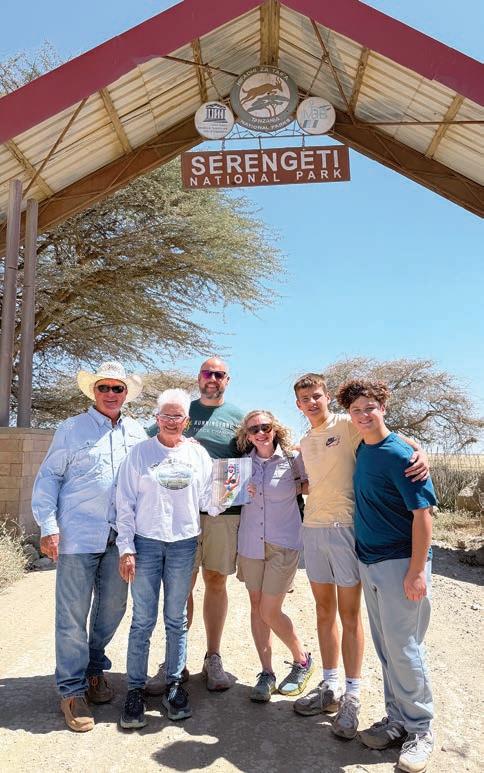
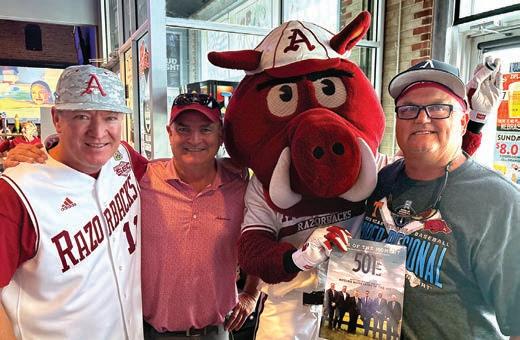
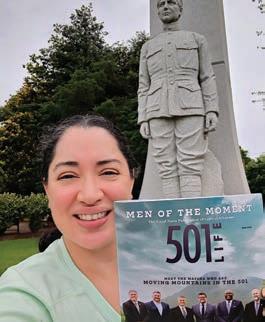



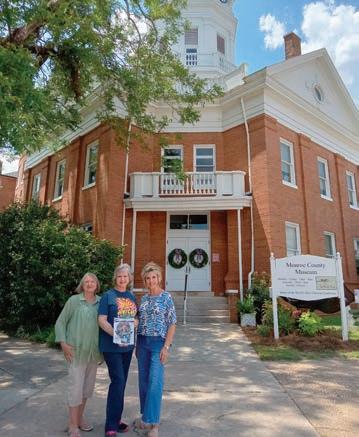




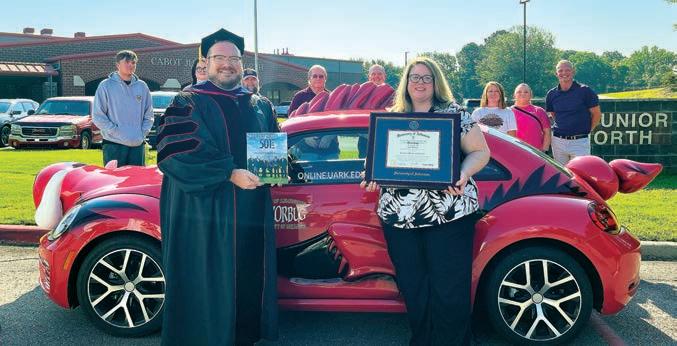
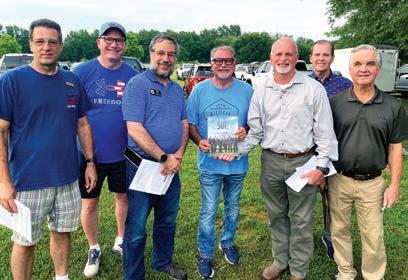

David
Meeks
Keith
Judge Allen
Colonel John
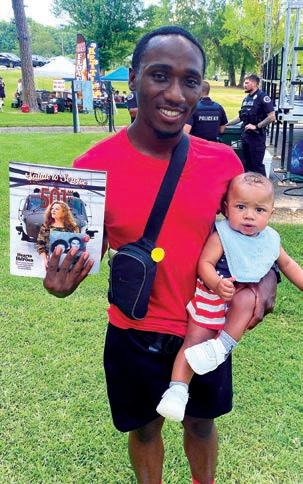



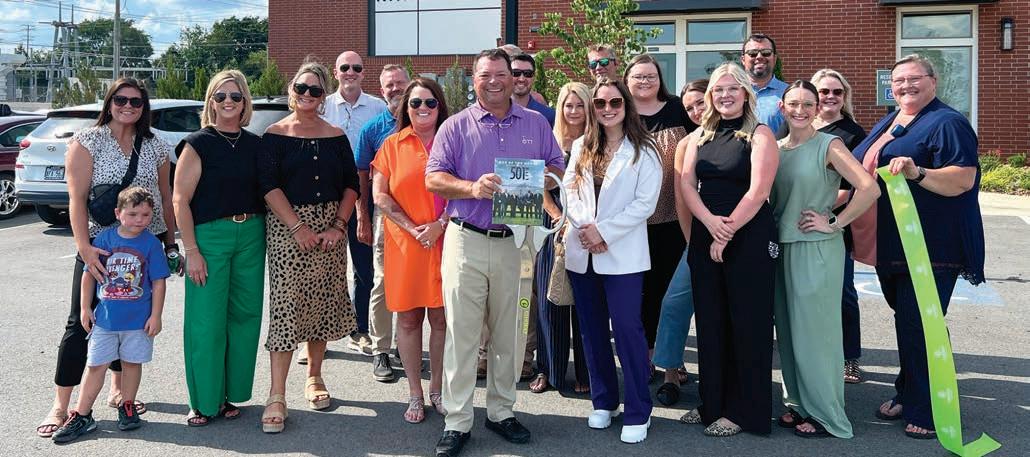
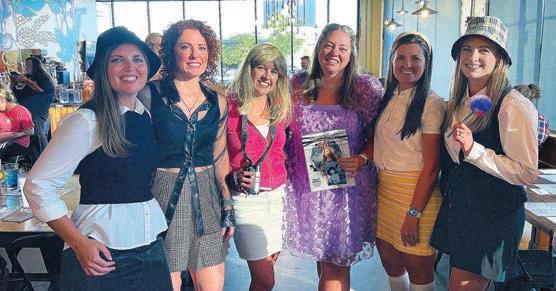

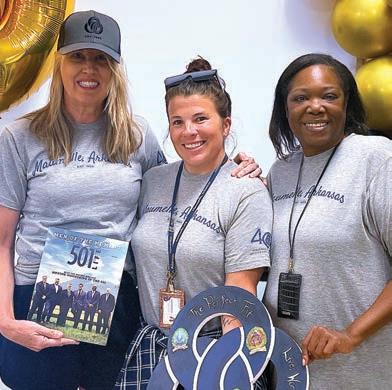

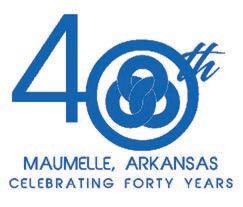
Maumelle’s 40th anniversary was celebrated June 21 with a walk-through museum at city hall. Organizers created a trip down memory lane by lining the halls and conference rooms with tons of mementos for attendees who were “Loving LIFE” as they relived history.
LEFT: Chief of Staff Deb Roush, Economic Development Director Courtney Dunn and Office Administrator Christie Grant.
and

Juneteenth in DaRock was hosted downtown on June 21 and attendees were “Loving LIFE” while celebrating the holiday. The event is unique because it takes place in the very footprint of the city’s early celebrations, dating back to the 1880s. These early celebrations were known as Freedom Day and were closely tied to the Mosaic Templars of America, which is central to the city’s African American history.


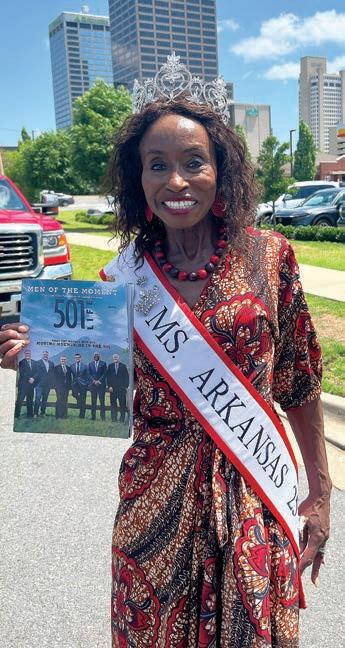

School of Nursing ribbon cutting heralds bright future of long term care in Arkansas through innovative program
The Arkansas Health Care Association (AHCA) opened the first-of-its-kind initiative in the United States with the opening of its School of Nursing on June 18 in Little Rock. It has developed a pathway for nursing and medical assistants at long term care facilities to become licensed practical nurses. This allows existing employees the education they need and want to advance in their careers.
Approximately 75 dignitaries and students attended the celebration as they gathered in the downtown Little Rock facility, which will host the central Arkansas cohort of LPN students who will be working toward earning advanced nursing licenses.
Speakers included Rachel Bunch, President of AHCA School of Nursing; Lt. Governor Leslie Rutledge; Rep. Brian Evans, Arkansas House Speaker; Sen. Bart Hester, Arkansas Senate President Pro Tempore; Cody Waits, Director of Arkansas Workforce Connections; Stephanie Isaacs, Director of Arkansas Office of Skills Development; Dr. Chris Lorch, Ozarka College Provost; Attendees: a representative from Senator Tom Cotton’s office; Representative from Senator John Boozman’s office; students of the inaugural class; and state legislators.
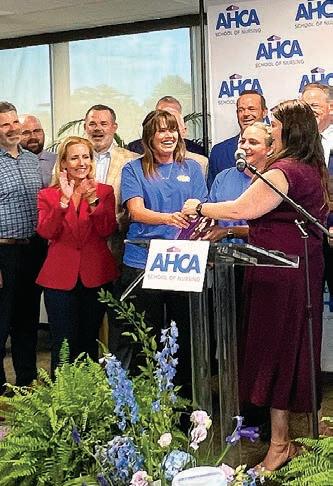
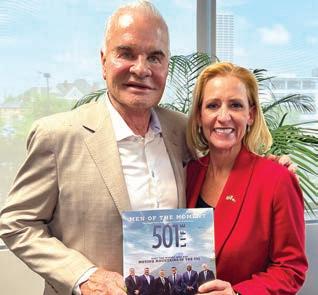

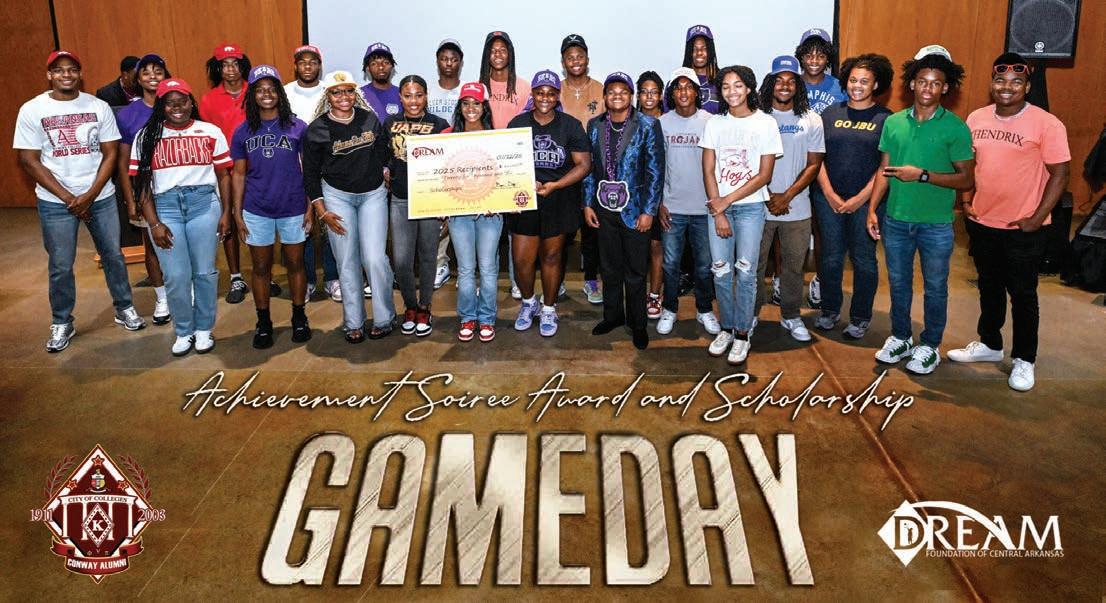
Groups come together to offer $26,000 in scholarships to minority students
By Paulette Higginbotham • Photos by Demetri Johnson
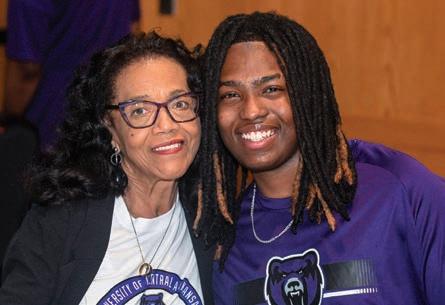


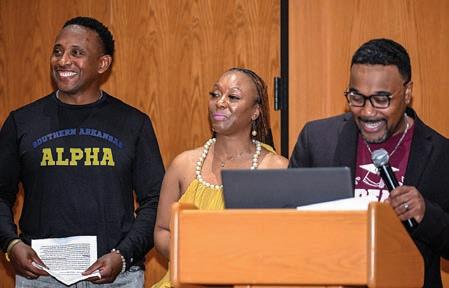



The Fourth Annual Achievement Soirée Awards and Scholarship GAMEDAY was held Saturday, July 12, at the Student Life and Technology Center on the campus of Hendrix College in Conway. The NFL Draft-style event was hosted by the Conway Alumni Chapter of Kappa Alpha Psi and the DREAM Foundation of Central Arkansas, along with Centennial Bank.
“This isn't your typical scholarship ceremony,” said Derrick Carruth, Kappa Alpha Psi scholarship coordinator. "We're creating an atmosphere that celebrates these students’ excellence with energy, excitement and community support — just like draft day."
The DREAM Foundation’s purpose is to promote youth empowerment by executing programs and supporting institutions that provide educational enhancements, leadership skill training and more to underserved minority students. It and Kappa Alpha Psi honored 39 students with college scholarships totaling $26,000. The GAMEDAY soirée featured music from DJ Cain while recipients walked to the stage, received their hat and declared their college or armed forces destination.
This year's GAMEDAY introduced the Corey "CJ" Clemons Jr. Memorial Scholarship, honoring the life and legacy of Morrilton High School basketball standout and Conway Kappa League member, CJ Clemons, who tragically passed away earlier this year. This scholarship was presented in his name to recognize students who exemplify excellence, character and resilience, all traits CJ embodied both on and off the court. The inaugural recipients are Aaron Lovelace of Conway Christian School, Emerie Bohanon of Conway High School, and Derrick Lewis II of Maumelle High School.
The Conway Kappa League focuses on promoting leadership, education, social and occupational guidance for young black men. Scholarships are awarded to its members who are graduating seniors with a record of academic achievement and community involvement. The 2025 honorees are Derick Lewis II from Maumelle High School, Nakelcion Bornds from Sylvan Hills High School and Jaydon Gaines, Malik Simpson and Lanston Ligon, all from Conway High School.


to
By
•

“Johnny and his team at First Security Bank have been a key community partner with us for all these years and from the bottom of my heart, I thank you.”
— James A. Loy. Executive Director of Renewal Ranch
The room had a congratulatory atmosphere as friends and colleagues gathered to celebrate the successful career of a respected leader and kind gentleman. After 44 years in the banking industry, and the past 25 as First Security Bank market president for Conway, Johnny Adams retired June 26 and a party was held at The Max Event Venue.
Community leaders and First Security Bank’s executive team took to the podium to praise Adams and his wife, Stacia, for supporting community causes, hosting events at their home and for consistently taking the time to listen and support people’s dreams. Adams and his family have lived in Faulkner County for several generations.
“What a run, 44 years!” said Pete Tanguay, founder of Rock Pond Pros and owner of The Max. “If you know Johnny, you know he cares deeply — not just about doing good business but about doing good. He always made time for people regardless of their title, their balance sheet or their background.”
Conway Area Chamber President and CEO Brad Lacy spoke about 25 years of working on projects with Adams. “My staff and I are often working on big dreams for this place, and often when you work on things like that, there’s a room full of no’s and you’re looking for the one yes, and you’re always the one yes. And I thank you for being the one yes,” he said. “You are a dreamer, and you have confidence that we can be something better than we are.” Lacy said Adams will continue as the chairman of the Conway Development Corporation.
Mike Baldwin has had the office next to Adams for 25 years. “Johnny has been our leader and role model, and our employees would like to say ‘thank you’ for leading us with a servant’s heart,” he said. “We’ve all been truly blessed by your kind and caring spirit.”
“Johnny Adams has done more for Conway than anybody I know, and he loves it and it’s just his heart,” Mark Ferguson, executive vice president of First Security Bancorp, said. “Stacia, you are so instrumental, and you are so important and you’ve been right there, and it wouldn’t have happened without you.”
First Security Bancorp Chairman and CEO Reynie Rutledge joked that people have asked when he would retire, and he said he knows why he is not going to retire. “It’s because I don’t have anybody who will say all the nice things that they’ve said about you [looking at Adams], so I’m going to keep working,” he said.
Rutledge met Adams on June 19, 2000, and said they have had an unbelievable time. “The bank was at about $1 billion when you came, and now we’re over $8 billion with mostly Arkansas customers. We truly like to be a significant part of the communities we’re in, and I don’t know if we have a leader who represents more of what we try to do than Johnny Adams,” he said. “He’s been instrumental in our company and everything we have done in the last 25 years, and it’s amazing and I appreciate it so much. I want to thank Stacia and Johnny for the blessing you’ve been to First Security. We love you and wish you well in your retirement.”
The bank’s leaders then welcomed Jon Ross Henderson to the podium. Henderson was recently named market president of Conway. He formerly served as senior vice president and commercial loan officer and has been part of the lending team for 20 years. Originally from Greenbrier, he has been a resident of Conway for more than 17 years.
Henderson holds a BBA from Arkansas Tech University, an MBA degree in business administration from the University of Central Arkansas and is a graduate of the ABA Stonier Graduate School of Banking at University of Pennsylvania. He also is a graduate of the Faulkner County Leadership Institute and Leadership Arkansas.
He has served his community and state in numerous Board of Directors positions, including the United Way of Central Arkansas, University of Central Arkansas Foundation Board of Directors, Arkansas Game & Fish Foundation, Deliver Hope, Conway Corporation and Conway Christian School Board of Trustees. He and his wife, Lindsay, live in Conway, are members of The Summit Church and have one son, Owen.

Hometown legend speaks to sold-out crowd at annual chamber meeting

as the voice of the Party Animals for the Savanna Banana baseball organization.
After a quick lesson in Banana ball, Toll shared the difficulties the organization overcame from its start. He provided examples and encouragement on how to stay motivated while navigating business challenges and roadblocks.
Toll shared that he takes his hometown everywhere he goes, and even went so far as to write “Vilonia” on the Green Monster, the legendary left-field wall at Fenway Park, when he was given the opportunity to sign. The young man got his start in broadcasting
talents have taken him all over the United States, including a time in Anchorage, Alaska. But Savannah and the Banana Ball organization is now home, second to Vilonia of course.
Master of Ceremonies John Kieth was in charge of keeping the crowd engaged and everything flowing smoothly. Chamber
President Jackie Fowlkes presented plaques to several individuals and groups for their significant contributions of time and resources to support Vilonia.
President Jackie Fowlkes gave closing remarks and recognized the contributions of outgoing President Tanya Hendrix.
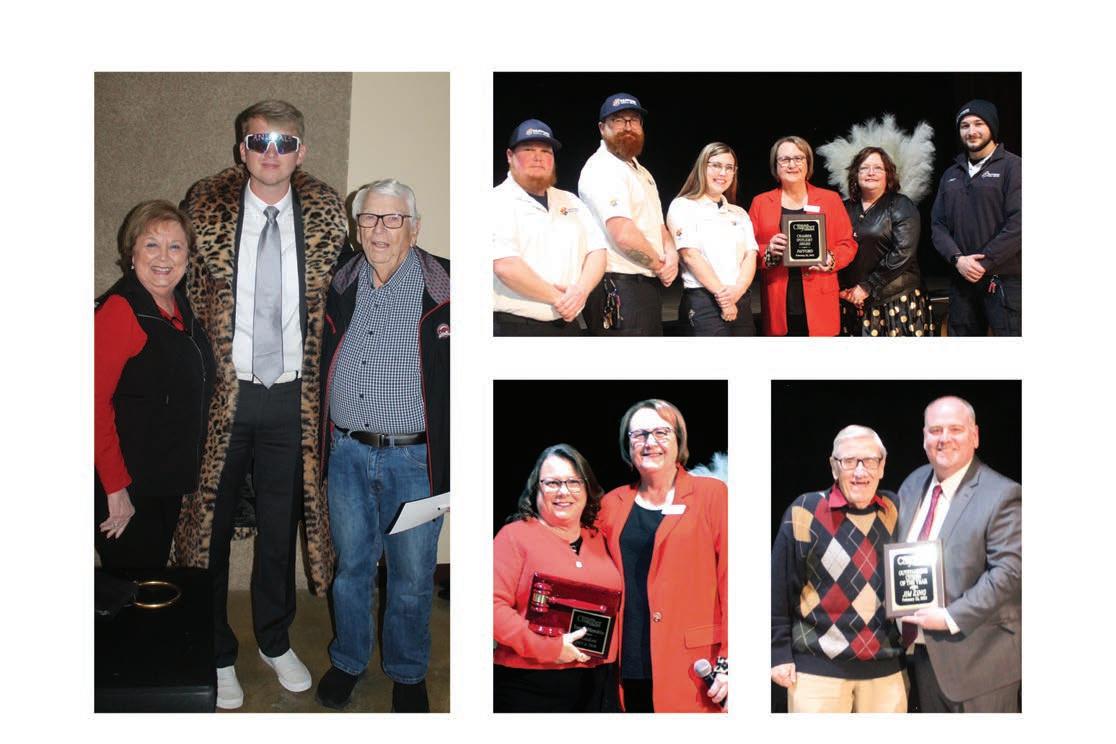

By David Grimes • Photos by Nelson Chenault

An overflow crowd gathered at the Clinton Presidential Library on July 15 to hear an energetic and inspirational speech from University of Arkansas basketball coach John Calipari. The head Hog was the featured speaker at the weekly meeting of the Rotary Club of Little Rock, which meets there in the Great Room each Tuesday for lunch.
Coach Cal will begin his second season in Fayetteville this fall, coming off a 22-14 record during his inaugural year, which included a trip to the NCAA Sweet 16 this past March.
Calipari told the crowd how he was raised in a Catholic, blue-collar, working-class household in Pennsylvania. His father was a steel mill worker and an airport baggage handler, while his mother worked in a school cafeteria.
He joked that years later, as he had become a successful college coach, his dad told him, “I don’t know what you’re doing, kid, but keep fooling them.” What he was doing was becoming one of the greatest coaches in the history of basketball.
Calipari got his first head coaching job in 1988 at the age of 28 at the University of Massachusetts. He led the Minutemen to the NCAA Final Four in 1996, before heading off to the NBA for a few years.
He returned to the collegiate ranks in 2000, when he was hired as head coach at the University of Memphis, leading the Tigers to the Final Four in 2008.
His success in The Bluff City led him to be hired to coach at the University of Kentucky in 2009. The Wildcats are arguably the bluest of the blue bloods when it comes to college hoops, and Cal did nothing to diminish that legacy.
During his 15 years in Lexington, his teams went 410-123, going to four Final Fours and winning the NCAA national championship in 2012. He was inducted into the Naismith Memorial Hall of Fame in 2015.
Calipari was asked by program moderator Rex Nelson to detail the circumstances that led him to Arkansas. He said that in April 2024, his longtime friend John Tyson set the wheels in motion.
After he was offered the job, Calipari said he was unsure what to do, but as he was seeking guidance, his priest advised him to go take a walk. Go walk for an hour as the coach at Kentucky, then walk back for an hour as the coach at Arkansas. When the walk was over, Calipari was a Razorback.
He described his first season in Fayetteville as one of the most rewarding he’s ever had. It was challenging at times, as the Razorbacks battled injuries while starting 0-5 in SEC play, but as the team came together, it finished strong with the impressive NCAA tournament run.
Expectations for the Razorbacks are even higher going into the 2025-26 season, as Calipari has added one of the best recruiting classes in the nation to an already stacked returning roster.




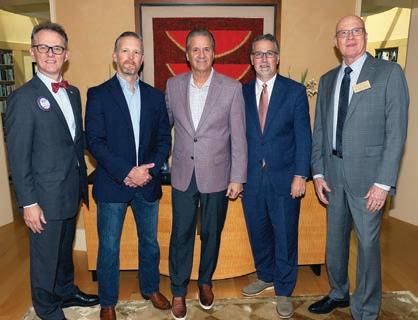

“I got the chance to meet General Wesley Clark, an American hero, at the rotary in Little Rock today. He gave me a challenge coin. I’ve always been a fan of his and admired his leadership.”
— Coach John Calipari





I am a Christ-follower, loyal wife and devoted mother, who has high expectations and is a tad blunt.
NATIVE OF: I grew up in Oppelo, which is also in Conway County.
CHILDREN: We have four children and a daughter-in-law: Cade Halbrook (wife, Jacque), Ashlyn, Hannah and Kynsleigh.
EDUCATION: I have a Bachelor of Science in Economics and Finance, and a Master of Arts in Economics.
WORK: I started my career as a staff accountant at FedEx Freight in Harrison (Boone County), eventually becoming director of finance. I also spent time working at Mercy Hospital in Fort Smith (Sebastian County) and Daymark Transportation, formerly in Russellville (Pope County). I quit work to be a stay-at-home mom. I returned to work as an adjunct economics instructor at University of Arkansas Community College at Morrilton. Currently, I teach business courses at Morrilton High School.
SPECIAL INTERESTS: I enjoy studying the Bible, reading books, tending to my flowers and spending time with my family.
COMMUNITY ACTIVITIES: We attend First Baptist Church in Pottsville. We attend a lot of sporting events (especially our kids’ events).
WHY DO YOU LOVE THE 501? I love the friendliness and kindness of our community. The community rallies around and helps those who are going through tough times. It is a special place.





We met in 6th grade and began dating in 10th grade (March 1988) until we were married. Shawn proposed on August 17, 1994, at a picnic on Petit Jean Mountain. We were married on June 24, 1995, at First Baptist Church in Morrilton by Dr. Bill Brown and Rev. LeRoy Patterson. We just celebrated our 30th wedding anniversary.
We both love spending time with our children and enjoying their activities. Our faith is important to us, and growing our faith is even more critical. We spend time reading the Bible together to deepen our knowledge of God’s Holy Word.


501 feature on KARK's Todd Yakoubian named winner at APW 2025 Communications Contest
Photo by Makenzie Evans
Arkansas Press Women announced the winners of its annual Professional Communications Contest at an awards luncheon June 21 at Central Baptist College in Conway. Work produced in a variety of communications fields during 2024 was eligible to compete.
Two 501 LIFE contributors entered articles and placed in the contest — Tammy Keith and Dwain Hebda.
Keith won awards for three articles published in 501 LIFE Magazine, including first place for a personality profile titled “Todd Yakoubian: Taking Central Arkansas by Storm,” which appeared in the June 2024 issue. Keith also won third place for “From Conviction to Creation,” which also was published in the June 2024 issue, and an honorable mention for “Lisa and the League of Kindness,” which was published in May 2024.
First-place entrants in the Arkansas contest who are members of the National Federation of Press Women (NFPW) advance to NFPW’s national competition. The winners will be recognized during the federation’s annual conference Sept. 11-13 in Golden, Colo. Keith's first-place entry on Todd Yakoubian advanced to national judging and won an award. Specific results of the national contest have not been released.
Another 501 LIFE contributor won the Sweepstakes Award in the state contest for the fourth consecutive year. The award is based on a point system that factors in entry ranking and the degree of competition in a category. Hebda of Little Rock, president of Ya!Mule Wordsmiths, Inc., won awards for two entries published in 501 LIFE Magazine, including honorable mention for “Pickin’ and Grinnin’” about Aaron Farris. It appeared in the January 2025 issue. He also won an honorable mention for “The Music Man” about Rojay Moore, which appeared in the June 2024 issue.

Of the total of 321 entries submitted in the contest and evaluated by independent judges:
• 80 entries, or 24.92 percent of all entries, received first place.
• 55, or 17.13 %, received second place.
• 36, or 11.22 %,,received third place.
• 77, or 23.99 %, received honorable mention.
• 73, or 22.7%, did not receive an award.


LET CHEF DON BINGHAM TAKE YOU TO
Photos by Mike Kemp
With fresh garden vegetables all around and plants in full bloom, my thoughts go straight to hearty salad options. Salads, when kept fresh, interesting and vibrant, never go out of style!
Among my favorites are the simple side salads with an amazing homemade dressing, the Cobb Salad and the Niçoise Salad. I have no doubt that you have your favorites as well! Though not necessarily a salad, I also enjoy varieties of slaws, especially the napa cabbage, thinly sliced with green onions and a lemon vinaigrette.
I have listed some refreshing ideas for these summer months, and now that tomatoes really taste like a scrumptious Southern delicacy, there are so many more options to consider!
Pair any good salad with crusty bread – with real soft butter of course – or toast points, bread sticks, toasted cornbread, saltines,
etc. Better yet, omit the carbs and enjoy a crunch support system in the salad, such as water chestnuts, cashews, pecans and toasted almonds.
“Presentation is everything” (a statement that has been around a long time and still has much merit to it)! This is a perfect time to use your favorite china, especially those clear dishes with the Depression glass greens and pinks. And use the real silver! There will be plenty of times to use the plastic and paper plates and give in to standing for the quick meal. Even with a simple but hearty salad, I’m going to decide which set of silver to use with tonight’s salad, and I may even get out the crystal for my Pepsi Zero!
Be creative class! Take advantage of all the garden planting; the rewards are great!
3 lbs. chicken tenders
16 oz. fusilli pasta
2 bundles of asparagus
2 cups toasted almonds or pecans
Spray a heavy pot with cooking spray. Place frozen chicken tenders in pot; cover with lid. Cook on medium heat for 10-12 minutes. Drain and shred chicken into chunks with a fork; cover and set aside. Toast almonds and cool. Cook pasta al dente. Rinse asparagus and clip ends; blanch in boiling water for 1-2 minutes. Cut into 2-inch chunks and set aside.
Prepare Sesame Ginger Dressing from the recipe below. In a large bowl, combine chicken, pasta and asparagus. Add toasted almonds and toss with the dressing.
4 Tbsp. sesame seeds
1/2 cup frozen orange juice concentrate
1 Tbsp. sesame oil
1/4 cup vegetable oil • 3/4 cup sugar
1 Tbsp. Worcestershire sauce
1 Tbsp. lemon juice • 2 tsp. garlic powder
1 tsp. ginger • 1 tsp. kosher salt
1/2 tsp. coarse black pepper
In a small skillet on medium heat, toast sesame seeds for about 2 minutes or until golden brown. Set aside to cool. In a blender, mix and then puree orange juice, sesame oil, sugar, Worcestershire sauce, lemon juice, garlic powder, ginger, salt and pepper. Pour dressing into a container; fold in toasted sesame seeds. Chill. Mix well before serving.
2 heads of romaine lettuce
2 lbs. thick-sliced, oven-roasted deli turkey
8 hard-boiled eggs
1 lime • 3 avocados • 3 tomatoes
Rinse and chop hearts of romaine lettuce into bite-size pieces; chill. Slice deli turkey into half-inch cubes. Peel hard-boiled eggs and slice. Slice avocados in half and remove pit; peel and cut into small chunks. Rinse lime and slice in half. Squeeze fresh juice over avocado and toss. Clean and slice tomatoes into eight sections. Arrange salad ingredients in a glass bowl. Cover and chill before serving with dressing.
1/2 cup vegetable oil
1 cup rice vinegar
1 cup sugar • 1 tsp. kosher salt
1/2 tsp. dried oregano • 1/2 tsp. dried basil
1/2 tsp. onion salt • 1/2 tsp. coarse black pepper
Combine oil, vinegar, sugar and seasonings in a blender and mix well. Chill before serving.
1/3 cup balsamic vinegar
2 Tbsp. red wine vinegar
2 tsp. Dijon mustard
2 tsp. Italian spices
3/4 cup olive oil
1/2 tsp. kosher salt
1/2 tsp. coarse black pepper
Mix all ingredients in a blender and chill before serving.


1.
Historical community celebrates 60 years of Arkansas roots and progress
By Lori Dunn
Menifee is a small town that just might have something for everyone.
The town of about 300 people is located right off Interstate 40 in Conway County, so it’s just a quick trip to the city. But it’s also a close-knit community where everyone knows everyone else. “I think that’s what we like about it. It’s a quick commute to Conway and Little Rock, but it’s a slower pace and you know your neighbors,” said Menifee resident Natalie Johnson.
Johnson and others in Menifee are now hoping other Arkansas residents will discover their hidden gem. This month, the town is hosting a weekend of events to shine a spotlight on Menifee and its history. At 6 p.m. on Aug. 29, a banquet will be held in the multipurpose room at Menifee City Hall at 68 N. Mustang. The event is open to the public and the dress code is cocktail attire. Tickets are $40 per person or $50 at the door, and $75 per couple. There will be live music from the R&B band SYNRG. The speaker will be Dr. Alice Hines, a highly respected Menifee native who retired as a professor at Hendrix College.
On Saturday, Aug. 30, a casual event including food trucks, games and concessions is planned at Menifee City Park.
Johnson is chair of the celebration committee. She grew up in Camden (Ouachita County) in the southern part of the state. But her mother’s family is from Menifee and, after attending the University of Central Arkansas in Conway, Johnson decided to make her home in Menifee. “I am proud to be a resident here,” she said.
Menifee has a long history as a community but has only been incorporated as a town since 1965. “Sixty years strong is our theme,” Johnson said. We want to celebrate that we are still thriving and doing things and turning 60.”
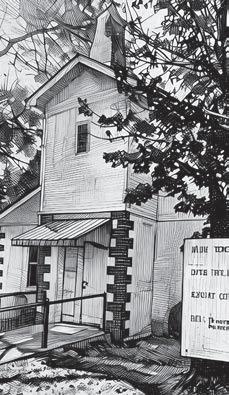
Menifee's roots began at Jamison Station, a half-mile west of what natives call "Old Menifee." At one time, Menifee had a train station and the first post office in the state with a Black postmaster.
For many years, Menifee was home to the only Black school in the area. In 1919, a group of parents from the region consolidated nine Black schools from communities in the county. Students were bused to the school in Menifee and, over the years, the school produced alumni who include several judges and doctors, Johnson said. In 1979, Morrilton, Plumerville and Menifee school districts merged to form the South Conway County School District.
Menifee has been a resilient community despite some hardships. In 1960, a tornado caused significant damage to the area. It destroyed five of seven buildings on the school campus in May 1960. Only the gym and the high school remained, and several people were killed. Because of the destruction, more homes and businesses were built back along Highway 64. The gradual move toward the highway also helped reduce flooding as the old highway had been prone to seasonal flooding. “Menifee is a resilient town, and we want to celebrate that,” Johnson said.
“I want people to know that we have a rich history, and that we do care about what goes on here,” Mayor Terry Coleman said. He is in his second year as mayor after serving on the city council for two decades. He wants to remind people that Menifee’s history deserves to be celebrated with annual events that bring citizens together to rebuild a sense of community.
“I invite people from the region to attend our banquet,” Coleman said. “We will celebrate our history and the people who make Menifee a great place to live.”





Imagine being back in preschool, where your days are filled with toys, snacks, naps and arts and crafts. Suddenly, the door opens and two large, green amphibians appear. It’s Croaker and Dazey, the Toad Suck Daze mascots, with arms full of storybooks, musical instruments and enough excitement to light up the whole classroom. Your eyes light up, not just for the mascots, but for the worlds waiting to be explored behind each page.
That’s the power of reading.
What might seem like a silly moment is actually part of a powerful movement: improving pre-K literacy in the 501. By age 5, a child’s brain is 90% developed. Yet many families miss out on one of the simplest, most powerful tools to boost their future: books.
“Reading together is one of the most quality times you can have as a family,” Child Care Aware Infant Toddler Specialist Carol Crockett said. “From choosing books with simple text and bright colors to using expressive voices and gestures, it is both easy and fun to bring any story to life.”
Her team at Child Care Aware of Northcentral Arkansas recently collaborated with the Conway Area Chamber of Commerce to deliver the premier reading event of the summer: the Toad Suck Daze Family Reading Challenge.
“Because reading at a young age is so important, I loved the thought of doing a reading challenge for our preschoolers,” Crockett said. “Not only did it encourage reading, but it engaged families, too. I asked the Conway Area Chamber of Commerce for their help in creating a program, and they couldn’t wait to jump in and spread the word.”
Continued on page 38
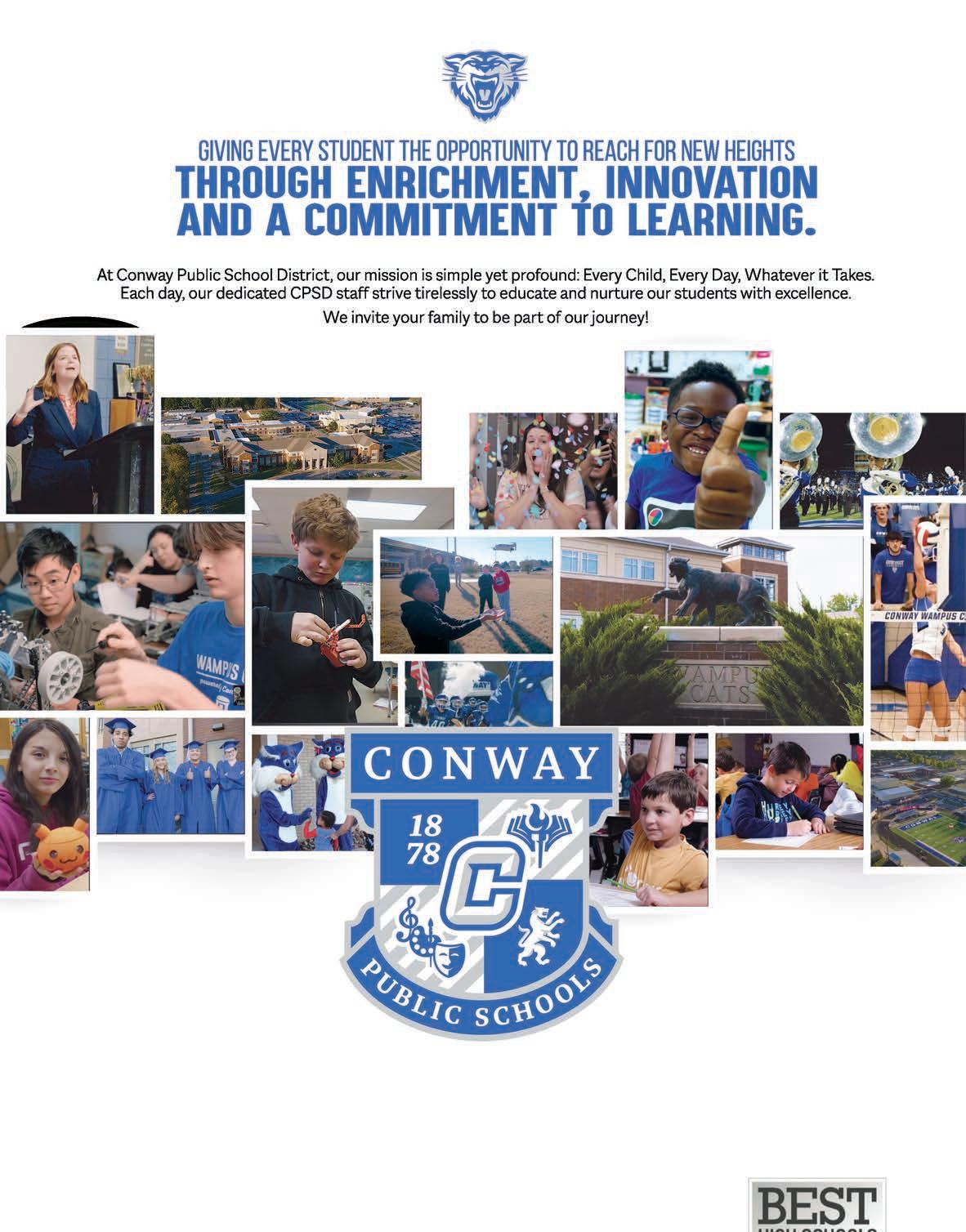
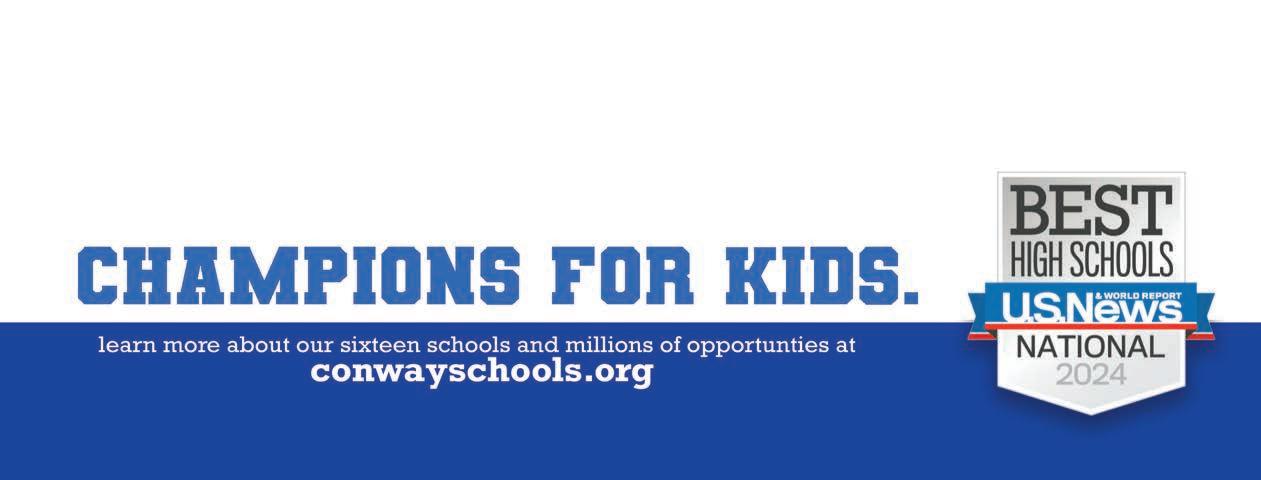

Open to preschoolers and their families across Faulkner County, the Toad Suck Daze Family Reading Challenge inspired parents and grandparents to pick up books together with their children, focusing on participation, not quantity. Joined by Croaker and Dazey, Crockett and her team visited five randomly selected participating schools with storybooks, musical instruments and a single mission: to show how fun reading can be.
“Croaker and Dazey brought excitement and energy to every classroom we visited,” Crockett said. “They participated in music time by singing, dancing, playing musical instruments, giving high fives, hugs and pictures with the kids. The facilities that participated loved it and the kids in every school we went to were giddy with smiles and enthusiasm.”
In a blend of literacy, local flair and amphibian-themed fun, the challenge adds a huge splash to Toad Suck Daze’s broader mission of supporting early childhood education while supporting Child Care Aware’s mission for community and family engagement.
Continued on page 41


‘Children remember laughter, hugs and the time you take to read to them.’
— Carol Crockett
To help infants and toddlers develop language and literacy skills, focus on creating a positive and interactive environment centered around books and language, rather than attempting to teach them to read in a formal way.
1. Talk and interact with your child often:
• Narrate your daily activities.
• Respond enthusiastically to their attempts to communicate.
• Engage in back-and-forth "conversations" by imitating their sounds.
• Introduce new words and explain their meanings in context.
2. Make reading aloud a daily habit:
• Start early, even with newborns.
• Choose books with bright colors and simple texts.
• Use expressive voices and gestures to make stories come alive.
• Point to words as you read, demonstrating the connection between spoken and written language.
• Let your child turn the pages and explore books independently.
• Don't be afraid to reread favorite books, as repetition helps learning.
• Ask questions about the story to engage your child.
3. Provide a print-rich environment:
• Keep books accessible in different areas of your home.
• Point out letters and words in everyday settings (cereal boxes).
• Provide writing materials like crayons and paper for exploration.
4. Incorporate language and literacy into playtime:
• Sing songs and nursery rhymes to develop phonological awareness.
• Play word games focusing on sounds and rhymes.
• Use alphabet blocks or magnets to explore letters.
5. Visit the library and participate in story time:
• Introduce your child to the library's resources and programs.
• Encourage them to choose books that interest them.
Information courtesy of ChildCare Aware
Following an impactful first challenge, Crockett and her staff are already hard at work planning for its return next April. “The Conway Area Chamber of Commerce was amazing in making this dream a reality,” she said. “Our goal was to get families involved and connected with their school and home and it was a resounding success. Despite having a little more than two weeks to plan everything out, we still had 540 families participate and read nearly 5,000 books. We feel confident that it will grow even more next year.”
Research shows that skipping out on reading with young children, even newborns, can lead to struggles that could carry into adulthood such as limited vocabulary, learning setbacks and difficulties adjusting to the workforce. Even just 10 minutes of reading a day can make a huge difference, building bonds, boosting confidence and nurturing curiosity.
“Children remember laughter, hugs and the time you take to read to them,” Crockett said. “The more strong, positive interactions a child has with a caring adult, the stronger their neurons grow and the healthier their brain development becomes. Building a positive association with reading can lead to a lifelong love of learning.”
Reading should feel like an enjoyable experience, not a chore. For parents and grandparents looking to take the leap with their child, don’t forget to have fun. “Use different voices for each character in the story,” Crockett said. “Tell the story with excitement, joy and amazement. At the end, go back and ask questions like ‘Why do you think they felt that way?’ and ‘What would you have done?’ Children desire that one-on-one time with you.”
Child Care Aware of Northcentral Arkansas supports early childhood education across 14 counties by offering professional development, coaching, technical assistance and business guidance to childcare providers. Through strong community partnerships, it tailors its outreach to meet the unique needs of each county while fostering deeper connections with families.
So, the next time your child reaches for a book, lean in and join the adventure with them. The pages aren’t just stories, they’re stepping stones to a bright future.

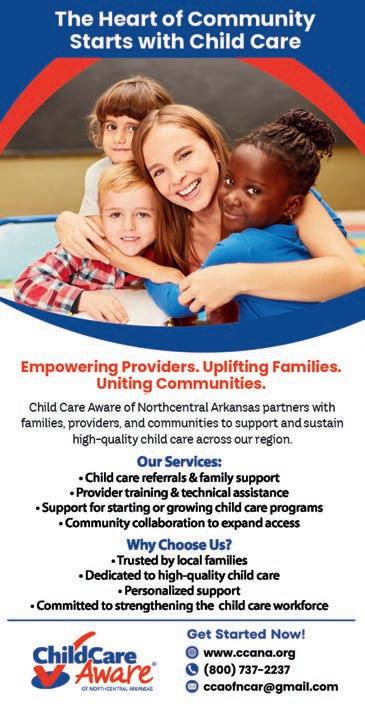


ByTammyKeith• PhotosbyMakenzieEvans
A children’s book written and published by First Service has a much bigger purpose than just promoting math and reading skills. Siblings Franklin and Sammy Cents are back with their adventures and mishaps in the third-in-the-series book, “When You See A Need, Do A Good Deed,” written by Jon Patrom, vice president of marketing, and Ashley Moore, marketing and brand manager. Patrom said the book’s message reflects the bank’s beliefs. “You have to have kindness,” he said. “You have to build goodness and wholesome values.”
Patrom helped the marketing team write the first book, “Franklin Cents,” for the bank’s 50th anniversary in 2013, “to give back to our customers. We didn’t want it to be self-serving,” he said. “There is no ‘I’ here [at the bank]. It’s a team effort. We’re all about doing unto others and giving back.”
Every first grader in the bank’s 11 locations receives the book, and branch employees read it to classes. The series features bow-tiewearing Franklin and his spunky little sister, Sammy, who operate a lemonade stand to raise money for everything from bicycles to giraffe food. A second book, “Franklin Cents Grows His Business,” was published in 2015, and this year the bank decided it was time for Franklin and Sammy to make a return.
“When You See A Need, Do A Good Deed” was announced to the public in early March during Read Across America week. It was illustrated by Ashley Moore’s son, Avery Moore, a senior Windgate Art Scholar majoring in fine arts at the University of Central Arkansas. Avery, who is unapologetically obsessed with giraffes, influenced the book’s zoo theme.
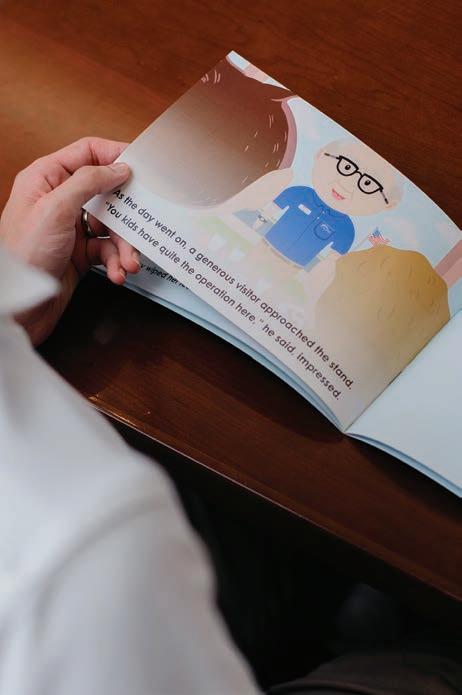
“I’ve drawn and painted giraffes since I was a kid,” he said. “I just think they’re really cool.” He had a giraffe motif on his groom’s cake at his May wedding and even fed giraffes during his honeymoon. “I had fun with my inner child and going back and drawing what I enjoyed as a kid,” Avery said.
He said working on the book with his mother, who is a graphic designer, was his favorite part. “I have a lot of good memories of creating with my mom,” Avery said. “It had been a minute since we got to collaborate, so this book was special to me because I got to work with her again.”
Patrom said the bank is a family, and it includes longtime First Service Bank President Tom Grumbles and his daughter, Robin Hackett, COO. Grumbles, Hackett and her daughters appear as characters in the book. Ashley said she worked with her son to “bring the images to life.”
First Service values patriotism and is known for its huge American flags, and the books include hidden flags for children to find. The bank’s corporate offices are in Greenbrier. The book complements First Service Bank’s Franklin and Sammy Cents children’s savings account which can be opened with only $5 and accrues interest with no monthly fees. Giving about 7,500 books to children who might not have any at home is another part of the project that warms Patrom’s heart. A digital audiobook version narrated by Patrom’s 9-year-old son, Duncan, and by Grumbles is available on the bank’s website, firstservicebank.com.
Patrom said the bank plans to continue the book series every other year with the same goals.
“We want to challenge [kids] with math questions, challenge them with reading,” he said.
“And also develop their character,” Ashley added. “Yes, we want them to know the importance of being smart with their money early — and learning how to manage their money … but more than that, what we were founded on is our family-oriented goodwill to the community. One of our slogans is, ‘Service is our Middle Name.’ It’s about practicing what you preach, teaching others to do the same thing, and that starts early.”

Greenbrier teachers are first-ever double honorees for National Teaching Award and featured together on Inspiring Teachers: The Honored Podcast.
Misty Burgess and Hailey Ellzey, business teachers at Greenbrier High School, have been honored with the prestigious Honored National Teaching Award for May 2025. As part of their honor, they each received a $5,000 cash award and were featured on Inspiring Teachers: The Honored Podcast.
Hailey Ellzey was nominated by student Jenna Whitley, who celebrated her for inspiring students to step outside their comfort zone and for consistently recognizing their growth. Misty Burgess was nominated by student Zandrea Story, who shared how Burgess empowers her students to think critically and helps them build a foundation for the future.
Both teachers are involved in Future Business Leaders of America (FBLA) and, through their pre-professional classes, they are setting students up for personal and professional growth. Their positive impact has been witnessed both inside and outside the classroom as they help students learn how to adapt to and thrive in a fastchanging world.
In Jenna’s nomination, she wrote: “When we go into Ms. Ellzey’s class, it feels like home. She always makes us excited to come to class, and it’s something to look forward to.”
In Zandrea’s words, Mrs. Burgess “has made me the best version of myself. She’s made me step outside of my comfort zone.”

Ellzey learned she had been selected through an email from a representative with the Honored Foundation. She said it meant the world to her that her student, Jenna, had taken the time to nominate her and communicate with them. It has reminded her how meaningful teaching can be. “It’s been a huge motivator because it opened my eyes to the many ways being a teacher can impact students not just academically, but personally and emotionally, too,” Ellzey said.
To hear more about the inspiring impact Ellzey and Burgess have made at Greenbrier High School, listen to their stories at 501lifemag.com/gbteacheraward.
Honored is a national nonprofit, nonpartisan organization dedicated to keeping great teachers in the classroom and inspiring a new generation of talent to pursue teaching, said Hannah Bowyer-Rivette, program associate. “Each month of the school year, Honored shines a spotlight on a teacher who has changed the life of a single student,” she said. The Honoree receives a $5,000 cash award, and Honored shares their story on their podcast and social media. Honorees are selected from Pre-K-12 teachers of all subjects at public, private, and charter schools across the country.
For more information, visit honored.org. To nominate a teacher, visit honored.org/nominate.

When you’re a basset hound, life can be very exciting.
When you’re a basset hound that lives with the first family of a university, you’re truly living the dog’s life!
By Colleen Holt • Photos by Makenzie Evans
Just ask Winston and Ted, two basset hound boys who live with Houston and Jenny Davis, the president and first lady of the University of Central Arkansas.
Winston Danger Davis (Winston) and Theodore Bear Davis (Ted) are frequent features around the campus at UCA. These two sweet boys are not only known for their long walks around campus, but also for their love of those people who are part of UCA’s campus community. They truly have stolen the hearts of everyone they meet.
“We love to walk the campus with the boys, and the students love seeing them and petting them,” Jenny said. “Often, as they pet Winston or Ted, the students will tell us about their dogs, show us pictures of their pets and tell us how much they miss them. Living on a college campus has spoiled the boys; they believe everyone wants to pet them!”
Winston and Ted are the Davises’ third and fourth basset hounds. “We love this breed because they are sweet and great with children, which is important to us. We host people at our home as we represent UCA, and it is important that we have dogs that love people and are not threatening,” Jenny said.
What drew the Davises to basset hounds is their gentle temperament. However, Winston and Ted show this in truly diverse ways. “Our dogs are definitely loving. Both dogs love to run and play together and appreciate some snuggle time on the couch. They are very
different, though. Winston, the larger one, has big feelings and is shy and often afraid. He is highly intelligent and empathetic, and I believe that is the source of his anxiety. Ted loves everyone and fears nothing. He is a happy soul.”
The two boys have been part of the family since they were puppies, following a long tradition of both Houston and Jenny growing up with dogs in the house. Houston is from middle Tennessee and Jenny, who is an adjunct English teacher at UCA, grew up in Mississippi.
“Our family includes us, of course, and our children Polly (29), Whitney (26), and Josh (23),” Jenny said. “The kids love coming home and visiting their dogs. Our oldest, Polly, lives in Atlanta with her husband, Mason, and they also have a basset hound, Dave."
According to the American Kennel Club standard, basset hounds are extreme in their devotion, have great endurance in the field and are not clumsy, although their gait may look to be. Their wrinkled brow and mournful eyes give a basset hound what is termed a sad clown face. Jenny has a different view of these gentle canines.
“Basset hound puppies are the most adorable of them all — floppy ears, big feet, sweet eyes,” she said. “Both Houston and I grew up with dogs, and we feel like our pets make our house feel like home. As long as we can take good care of them, we will always be a dog family.



‘Living on a college campus has spoiled the boys; they believe everyone wants to pet them!’
— Jenny Davis


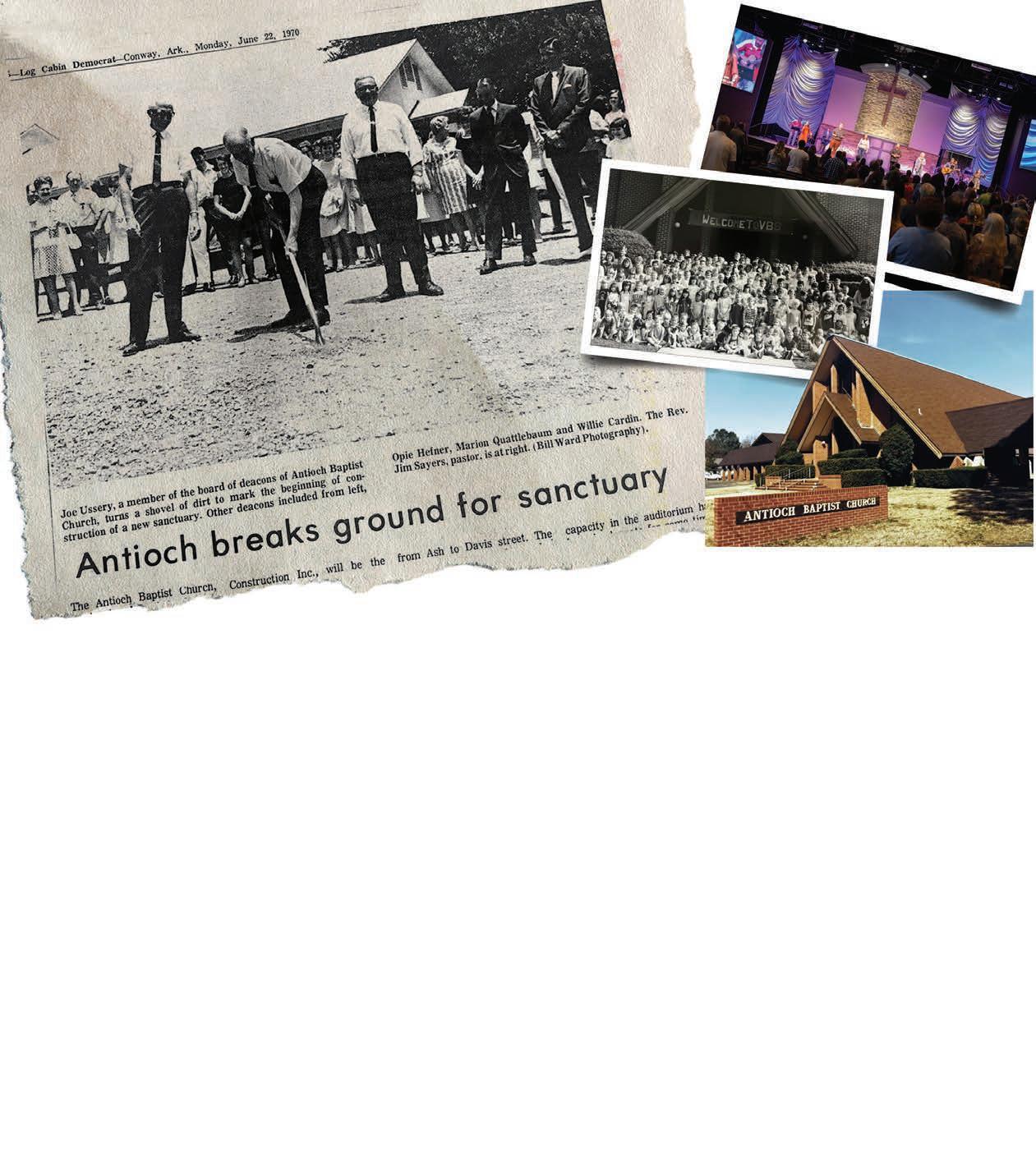
Antioch Baptist Church celebrates 100 years in Conway
This summer marks a momentous milestone for one of Conway’s most enduring and impactful faith communities. Antioch Baptist Church is celebrating its 100th anniversary. With a legacy rooted in humble beginnings and a mission that’s grown to reach far beyond Faulkner County, the church’s centennial celebration is both a time of reflection and anticipation for what lies ahead.
Antioch’s story began on July 28, 1925, when 10 believers gathered for a revival under a brush arbor on Arkansas Highway 60, just west of Conway. That revival sparked the formation of the church. “Our earliest records show that the church initially met just one weekend a month in the homes of members,” said Pastor Jason Aultman, who has led the congregation since 2008. “From those earliest days, it was clear that God was building something special.”
In the years that followed, Antioch met in a variety of temporary locations, from the Reeves School House to the old Faulkner County Library downtown to a rough lumber tabernacle with a dirt floor and kerosene lamps at Duncan and Davis streets.
Though the church faced challenges, including a pause in regular meetings during the Great Depression and the loss of their tabernacle to a fire, its members remained faithful.
By 1939, the church laid the foundation for more permanent facilities on what came to be known as the Bishop lots. Weekly services began in 1948, and Antioch flourished for decades at its South Boulevard and Davis Street location. As the congregation grew, so did its need for space, leading to the construction of an auditorium and education building.
In 1997, the church relocated to its current home at 150 Amity Road, then a quiet stretch near Interstate 40. “There wasn’t much here at the time,” Aultman said. “But now we find ourselves surrounded by restaurants, neighborhoods and shopping centers. It’s become a hub of activity — and a perfect place for us to serve and grow.”
By KD Reep
To commemorate 100 years of ministry, Antioch will host a Homecoming Day celebration at 10 a.m. on Sunday, Aug. 10, at the Conway Expo Center. “We want the whole church family to worship together in one service,” Aultman explained. “We’ll enjoy lunch afterwards and have games for the kids. It will be a great time of fellowship and an opportunity to give thanks for God’s amazing blessings.”
The anniversary is not just for long-time members, but for anyone touched by Antioch over the years or those curious to discover its vibrant community. “It’s open to all,” Aultman said. “If you’ve ever been part of Antioch, or if you’re looking for a church family, you’re welcome.”Today, more than 2,500 people call Antioch their church home. The church has extended its reach well beyond Conway through global ministry partnerships and church planting efforts in places like Georgetown and Celina, Texas. “It’s incredible to see the mission field coming to us,” Aultman said. “We want to continue helping people, reaching people and being faithful with the torch God’s given us.”
Aultman, who began his journey at Antioch as director of student ministries in 1993 and has served in nearly every role since, credits the church’s longevity to its commitment to community and service.
“Even if I didn’t work here, this is where I’d want my family to be,” he said. “There’s just something extraordinary about this church family.”
As Antioch steps into its second century, its mission remains unchanged. “We want to be found faithful — worshipping together, growing together, serving together,” Aultman said. “Faulkner county is blessed with many great churches and we count it a privilege to serve in this area.”
Weekly services continue at the Amity Road location every Sunday at 9 a.m. and 11 a.m., with Bible studies for all ages at 10 a.m. As the community reflects on 100 years of Antioch’s journey, the church invites everyone to join the celebration — and the story still being written.


Lead Arkansas program is one of the most successful in the nation
By Judy Riley • Photo by Kerry Rodtnick
One of the best strategies for strengthening communities of any size is creating a leadership pipeline that continues through generations. That process has played out right here in Arkansas for more than 40 years. The Lead Arkansas (LeadAR) program received initial financial support from and was modeled after the W.K. Kellogg Foundation’s leadership design. Many states used the original seed money to start their programs, but few have succeeded the way Arkansas has. Since its founding in 1984, more than 500 Arkansans have graduated from LeadAR, conducted by the University of Arkansas System Division of Agriculture’s Cooperative Extension Service (UADA-CES). Graduates now lead businesses, communities and organizations across the state. Alumni include a wide array of professionals: educators, farmers, advocates, bankers, lawyers, state legislators, mayors and local government and community leaders.
LeadAR is an 18-month intensive, hands-on program beginning with a three-day team-building and goal-setting seminar. The pristine and secluded space for the initial meeting is the C.A. Vines Arkansas 4-H Center in west Little Rock. Six two-day seminars with tours, guest speakers and interactive activities are then conducted around the state. Intermittent video conferencing continues throughout the process. Two aspects of LeadAR that are not necessarily included in most leadership training programs are a national study tour to Washington, D.C., to learn about the intricacies of the policy-making process and an international study tour that exposes them to global issues affecting the U.S. as well as Arkansas.
“LeadAR’s impact goes far beyond the 70-plus Arkansas counties where graduates of the program employ their enhanced leadership
skills to serve and improve their communities. Their success stories continue through service as elected officials, in other key decisionmaking positions and on boards and committees at the local, state and national level. Their knowledge of the critical issues affecting communities and the available resources to resolve them make them valuable authorities to serve others,” said Dr. Joe Waldrum, a retired UADA professor who directed LeadAR for more than 20 years.
LeadAR brings together people from all areas of the state and prepares them to assume greater leadership responsibilities to benefit their communities. They learn to improve their ability to work with others and connect with people and resources that can help them make a difference. Class 21 has just begun their training. The group is as diverse in interests, vocations, locations and experience as all those were before it. Being accepted into the program is a competitive process of rigorous vetting through application forms, references and personal interviews. The complete current class list can be found at uaex.uada.edu/leader.
There is a synergy among class members that has become the unintended consequence of this training. When the first session begins, few have had any contact with any other class member.
“By the time the 18 months is done, they not only learn from the experience, but they learn from each other. They become fast friends and their contacts continue to benefit them both personally and professionally. Watching this happen and being a part of orchestrating opportunities for classmates has been my great reward in this job,” said LeadAR Director Dr. Julie Robinson, professor of community, professional and economic development with UADA.
Continued on page 54



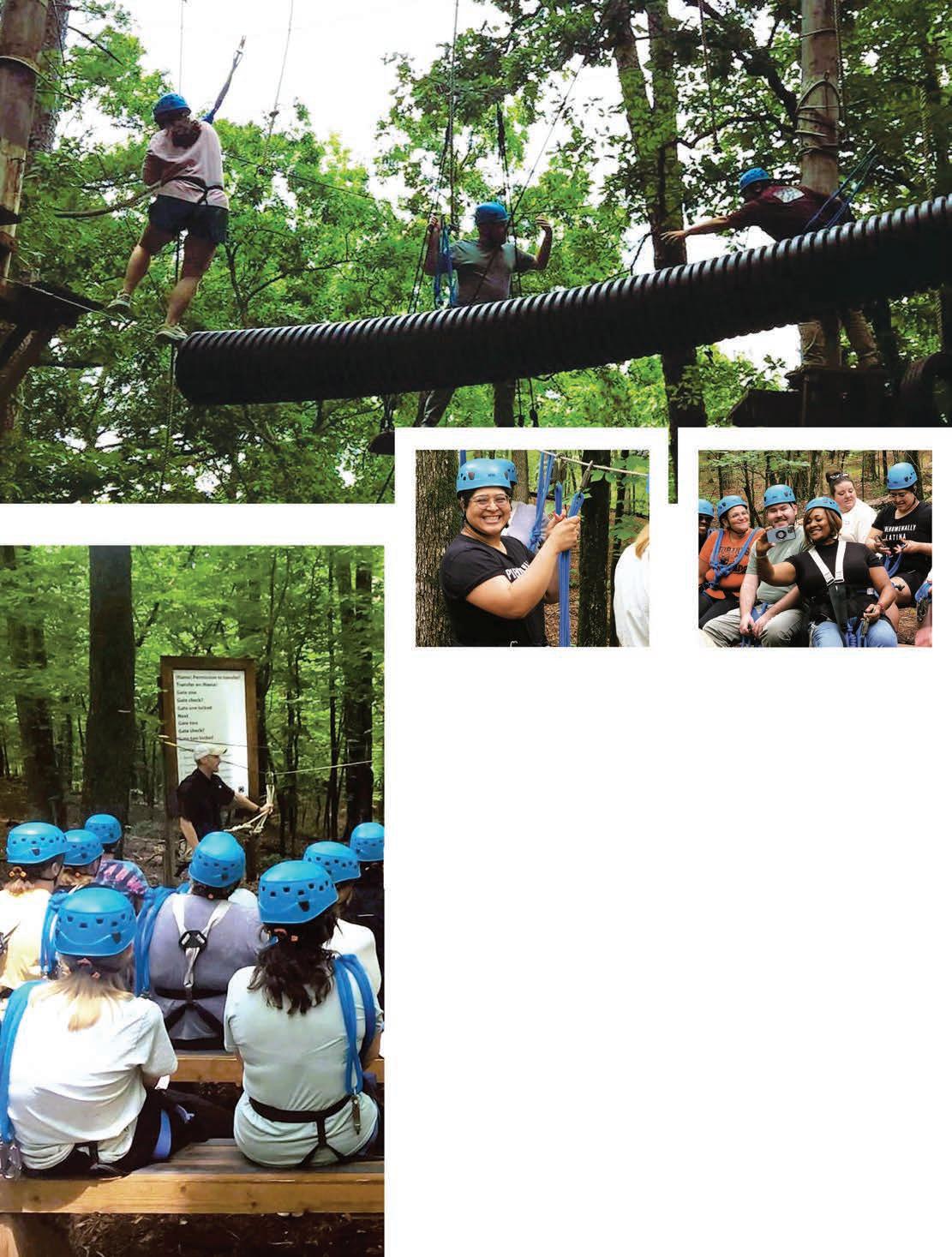
“Participating in LeadAR was truly transformational. It deepened my understanding of Arkansas’s most pressing challenges and inspired me to be a more effective leader in my community. I have since been elected to the Benton City Council in 2020 and got my doctorate in 2021,” Robin Freeman said. She was a part of Class 14 and currently serves as director of University of Arkansas Center for the Utilization of Rehabilitation Resources for Education Networking Training and Service.
“LeadAR is the most consequential thing I have ever done! I had just been elected mayor of my town, and the skills I learned and the contacts I made were invaluable to me and my ability to help my community. Not a day goes by that I don't use something I learned in LeadAR. Not a week goes by that I don't work with a local contact or friend I made in LeadAR. Not a month goes by that doesn't find me in contact with a state or national leader that I met because of LeadAR. Not a year has gone by that I am not in contact with an international friend or leader that I met because of LeadAR. I know my community and I are better for having had the experience and I believe Arkansas is better too,” said Don Richardson, LeadAR Class 3 graduate from Clinton. Richardson went on from small-town mayor to federal Agriculture Department undersecretary during the 1990s to business entrepreneur with SolaRid, AR, LLC.
One of the hallmarks of this program is the continual giving back of participants. Each is required to take their experiences and contacts back to their community to complete a service project. Those have varied from running for an office, lobbying for legislation that affects their interests, creating festivals, to establishing a community library. Beyond that, they continue to give to their communities and to support the very program that encouraged them. When a seminar is held in their own community, LeadAR alums take charge of raising funds and securing presenters. “We would not be able to provide the rich experiences throughout the state without the assistance of our alums,” Robinson said.
More information about LeaadAR is available at uaex.uada.edu/leadar or by contacting jrobinson@uada.edu.


With a passion for knowledge and the family name Feather, a 501 farmer was destined to soar.
By Judy Riley • Photos by Makenzie Evans
The term lifelong learner does not begin to describe this gentleman’s search for knowledge. Keith Feather’s life as a farmer, a business owner and community servant has been an ongoing learning process. He is intentional, focused and thoughtful, always with a look to future benefit, not just for his family, but also for his community and the world around him.
“I knew as early as high school that I wanted to pursue a career in farming, although my parents never pushed me to do so,” he said. “What they did was offer to help with my dream.” He was encouraged by his dad, Floyd, to get a good education. After a degree in plant science from Arkansas State University in Jonesboro in 1982, he returned to Griffithville, a small White County town. He intended to farm with his dad and marry his bride-to-be, Tammy
Flowers. His study of applied agriculture began in earnest while he and Tammy raised their family.
The farm was originally a modest-sized row crop farm, but it grew to 1,500 acres, one of the most profitable and diverse farms in Central Arkansas. Typically, the farm included 50% soybeans, 25% rice and 25% corn, rotated on an annual basis. After much study and research, the farm now includes 130 acres (about twice the area of a large shopping mall) of pecans.
“We were the first in the county to own a laser land leveling system just as rice acreage was expanding,” Feather said. “My dad started surveying rice levies for other farmers all over the county. Because of the drought in 1980, precision land leveling became key to better water management. Today, except for a field just purchased,
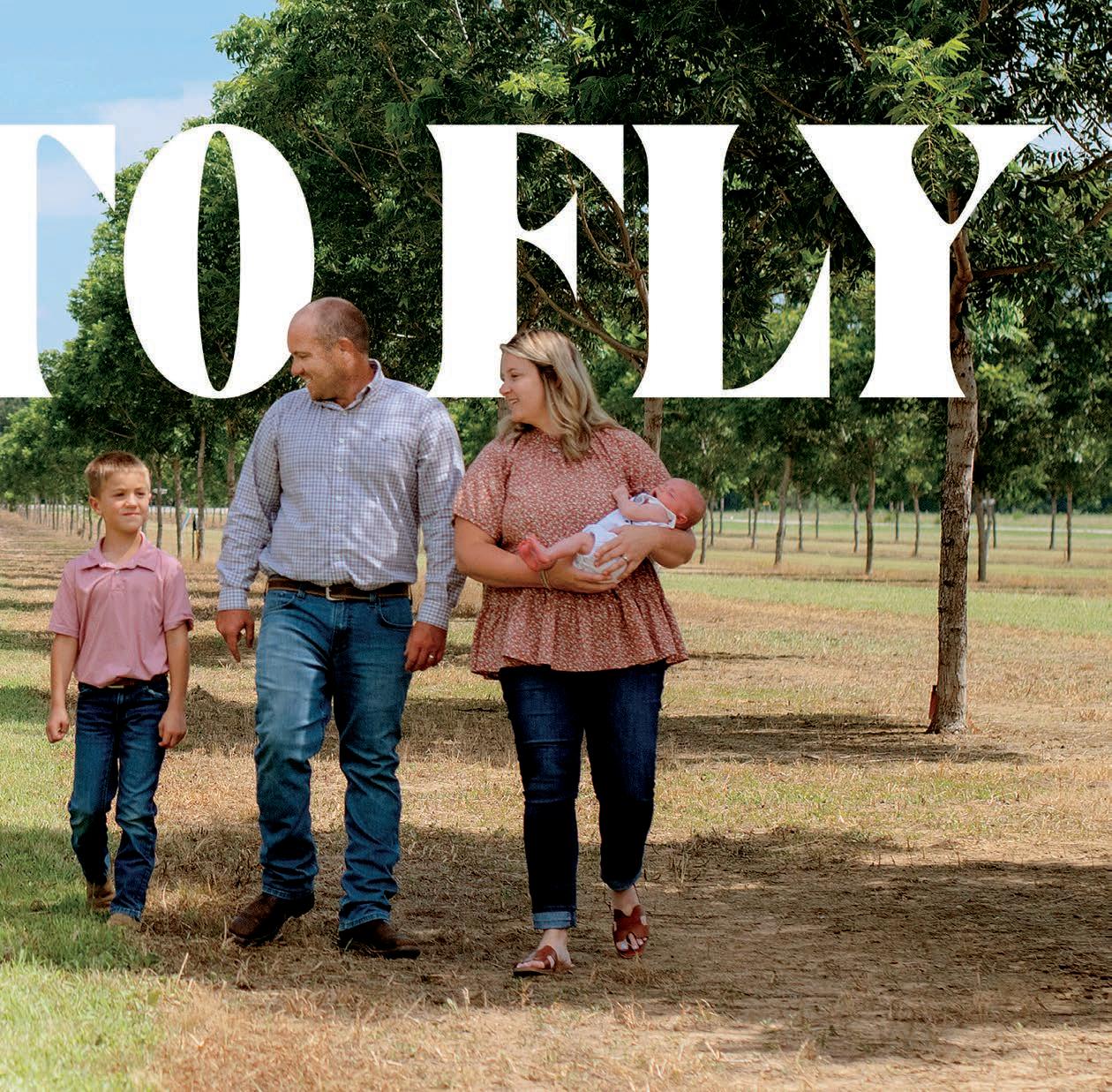
the entire farm is leveled. We have about 20 miles of underground irrigation piping with four reservoirs, which helps to make our irrigation system more efficient. We can recapture and recycle around 90% of our water. In 1990, my dad retired, and we sold the surveying business. The farm was incorporated as Feather Farms Inc.”
Feather is recognized as a leader in agriculture by his peers and associates. “Keith is a faithful steward of the land,” said Amanda Mathis, State Conservationist with the Natural Resource Conservation Service. “That takes a willingness to adopt new and innovative techniques for long-term sustainability. He has drawn on mentors in the farming community and used all available resources to improve his operation. When he ever decides to retire, he will be passing down an operation that has been enhanced by his hand and care.”

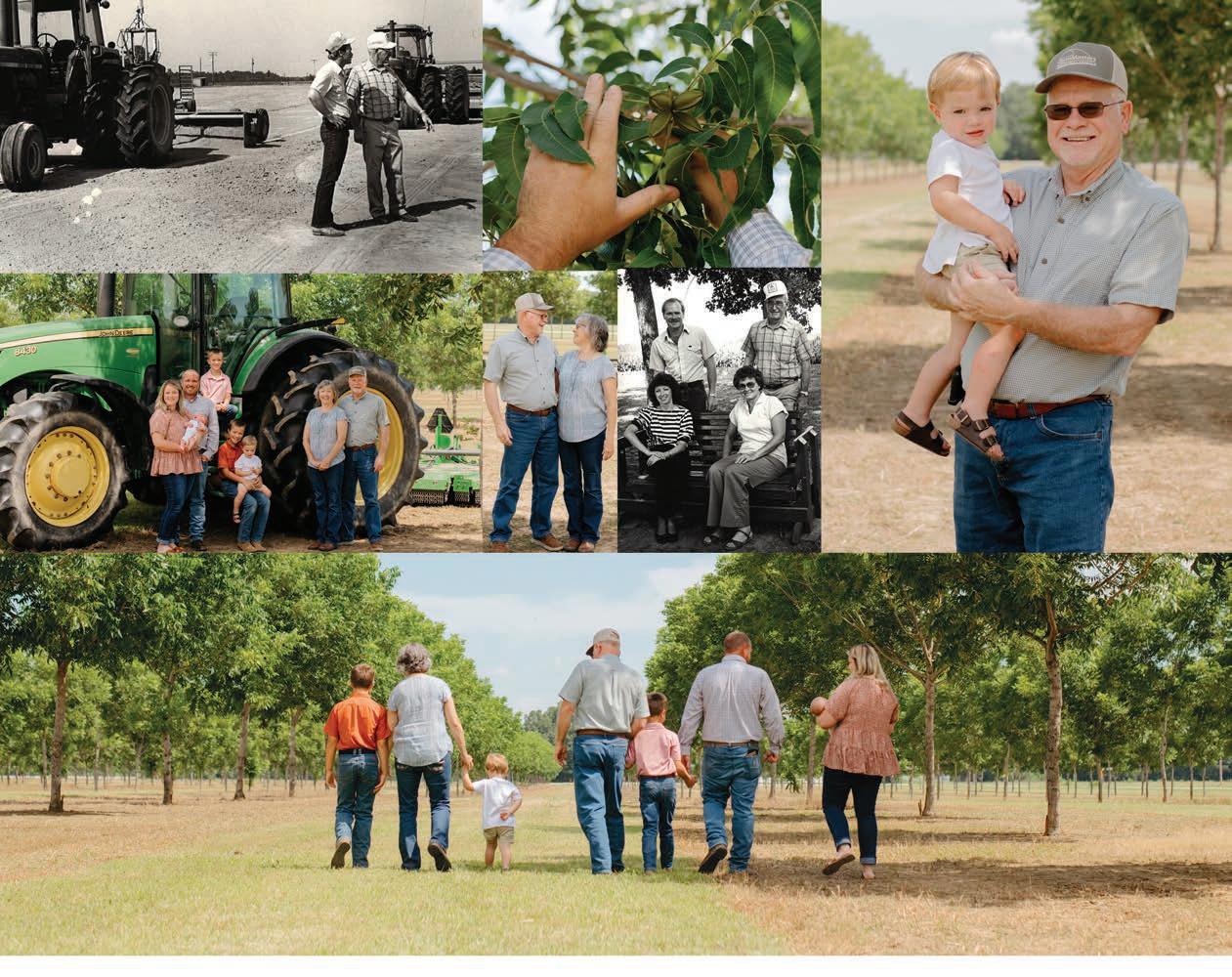
“It is only the farmer who faithfully plants seeds in the Spring, who reaps a harvest in the Autumn.” .— B. C. Forbes
To diversify, Feather and two college friends purchased Gym Masters, a gym floor installation and refinishing business. After the death of one of the partners, he and remaining partner Brett Farris employed Keith’s son Koby as part of the team. “Whatever Keith gets into, you can be assured he has researched it thoroughly,” Farris said. “He will know more about it than anyone else. He is first a Christian, with good moral character and a pleasure to work with.”
The farming enterprise is moving into the third generation. “Tammy and I raised our sons Koby and Jacob with a focus on providing a good education, encouraging a good work ethic and modeling strong Christian values. We never pushed them into farming,” Feather said.
Their youngest son, Jacob, started college intending to become a nurse but decided that was not for him and asked his parents if he could farm. He completed an MBA at Harding University and formed Dogwood Farms LLC along with his wife, Callie. Father and son then partnered, creating Feather Farms Partnership.
Feather is diminishing his role in the partnership and concentrating on Feather Pecan Co. “The farm as it exists is not large enough to sustain a multi-family row crop operation. Given the location, expansion was not an option,” he said.
To solve this problem, he researched several crops, and planting pecan orchards was the answer. He even intercropped soybeans between the pecan trees to generate income until the trees mature. In six short years, the first crop was harvested. Plans include expanding the acreage and providing locally grown pecans for direct marketing. Learn about them through featherpecan.com.
Maintaining, improving and diversifying the farm is a result of Feather’s need to learn. “Whenever I became interested in a new venture or investment, I dedicated countless hours to studying the subject in-depth,” he said. When he developed an interest in rental properties, his research led him to earn a real estate license. When he began earning an income, he became motivated to better understand taxes. That led to a part-time job with H&R Block. He admits not every venture turns out as expected, but there is always value in the process.
The reason for his success? “I read frequently, though not typically for leisure. I read for information or knowledge. I enjoy learning, which is likely why I enjoy spending time with people who are smarter than me.” This philosophy, plus his desire to serve others, has led to his making time to give back. He served on the Board of Directors of Unity Health for 24 years during Unity’s unprecedented growth. Much of that time, he was vice chair and involved in the expansion from one three-story hospital in Searcy to a network of acquired hospitals and clinics in Central Arkansas. His service includes, but is not limited to, the Southeast White County Fire Department, the County 4-H Foundation Board, the Community Foundation and his church. He recently led efforts to revitalize the Griffithville Community. He chairs the town’s Community Development Organization and is a member of its Civic Club.
Feather is an unassuming, humble, all-American guy who grew up a farmer’s son and returned to his roots. He made his family’s life better, then helped make his community, his town and his county better. Simply put, his lifelong quest for knowledge makes him a 501 star.



By Melissa Speer
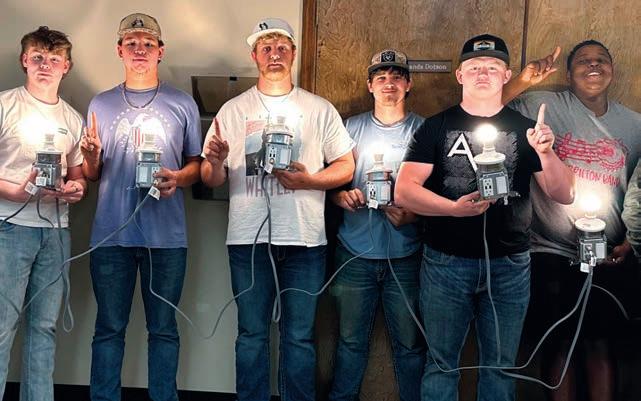
Koontz Electric believes in more than powering facilities; the Morrilton-based business believes in powering futures. One of the company’s mottos is: “Don’t just dream about your future — build it!” That’s why Koontz invests in the next generation of skilled workers through two educational partnerships with the University of Arkansas Community College at Morrilton (UACCM): the Arkansas Construction Education Foundation (ACEF) Pre-Apprenticeship Program and the Koontz Promise Program. Both initiatives are helping build lives, careers and the workforce of tomorrow.
Now in its fourth year, Koontz’s Pre-Apprenticeship Program is a 20-week course designed for high school seniors interested in skilled trades. Created in collaboration with ACEF, it blends classroom instruction with hands-on experience and provides nationally recognized certifications, including OSHA 10 and CPR/First Aid.
Students also gain exposure to real-world job sites. So far, Koontz has hired 19 graduates directly from this program. In their second year of apprenticeship, these employees average $50,000 annually plus full benefits. That’s real income, real careers and real futures taking shape. Another 17 of the graduates have gone on to build successful careers in other trades.
For Alfredo Fernandez, a recent graduate, the experience was life-changing. “The Pre-Apprenticeship Program helped shape my decision to work in the electrical field,” he said. “It sparked more interest in working in this industry. I got lucky that Koontz hired me, and although I’ve only been here for a month, they are like a family to me.” Elijah Orsbun, a 2023 graduate, agreed. “The program gave me the opportunity to work for a good company, earn great money, and [gain] a good head start on the job,” he said.
For students interested in a technical college route, the Koontz Promise Program provides financial and career support to River Valley High School students enrolling at UACCM. This initiative covers all educational expenses not already funded by other sources for those studying welding, construction technology, or industrial maintenance and mechanical technology.
Students can begin as early as their sophomore year of high school, allowing them to get a jumpstart on their careers while earning their high school diploma. This early exposure accelerates learning and opens doors to financial independence and long-term stability. Best of all, it enables students to graduate debt-free with the assurance of a secure, well-paying job with Koontz. It’s more than a scholarship, it’s a promise of opportunity.
“In high school, I had no idea what I wanted to do until a recruiter came to our school and spoke to us about the Koontz Promise,” said Sam Hart, a recent graduate and Koontz hire. “I felt it was the right path for me. I chose to start attaining my associate's degree while still in high school through UACCM. After graduation, Koontz hired me, and I'm glad I took this opportunity.”
“Both programs reflect Koontz Electric’s belief that investing in students is investing in the future,” said Melissa Speer, marketing and recruiting specialist at Koontz. “Through handson training, financial support and career path opportunities, Koontz is helping students gain more than just job skills; they are helping them achieve stability, purpose and pride.
“I’ve had the privilege of visiting schools, speaking with students, attending pre-apprenticeship classes, and guiding them through the hiring process. I’ve seen students go from uncertain to confident and excited about their future. Being part of that journey is incredibly rewarding and fuels my passion for this work."
Koontz Electric is playing a role in shaping the future of the workforce through strong partnerships with ACEF and UACCM and through education, creating real change one student at a time.

D
r. Jeremy Langley was appointed as the next president of Central Baptist College, the institution’s Board of Trustees announced recently. He assumed the role on May 27, becoming the 10th president in the college’s 73year history.
He succeeds Terry Kimbrow, who retired May 26 after more than 20 years as president.
Langley brings more than two decades of combined experience in higher education, ministry and leadership to the position. He has served as CBC’s executive vice president since August 2024. Before arriving in Conway, he spent more than a decade as the associate pastor of Brister Baptist Church in Emerson and seven years in various roles at Southern Arkansas University, including assistant to the president, associate director of athletics and assistant director of development.
“Speaking for the entire CBC board, we are thrilled to name Dr. Jeremy Langley as the new president of Central Baptist College,” said Kirk Shelton, Board Chairman. “Our search began over a year ago with the announcement of President Kimbrow’s planned retirement this year. We believe that God brought Dr. Langley to us, and as one board member said, ‘He checked all the boxes and exceeded our expectations.’ Dr. Langley hit the ground running, working alongside President Kimbrow last fall, and
has developed a great relationship with administration, faculty and staff. I believe he is the right man in the right place at the right time.”
Langley holds a ministerial doctorate in ministry leadership from Liberty University, a Master of Arts in pastoral theology from the Baptist Missionary Association Theological Seminary, a Master of Public Administration from Southern Arkansas University, and a Bachelor of Arts in political science and mass communications from Ouachita Baptist University. He formerly served as a Justice of the Peace on the Columbia County Quorum Court, where he chaired the court’s finance committee.
“I am honored to accept the call to serve as president of Central Baptist College,” he said. “This institution has a rich legacy of preparing students for lives of service grounded in biblical truth. I look forward to building on that legacy and leading the college into a season of growth and impact. My chief goal is to ensure CBC continues to be a place where Christ is exalted and God is glorified.”
Founded in 1952 and affiliated with the Baptist Missionary Association of Arkansas, Central Baptist College is committed to transforming lives through education that integrates Christian faith and academic excellence in a Christcentered environment.
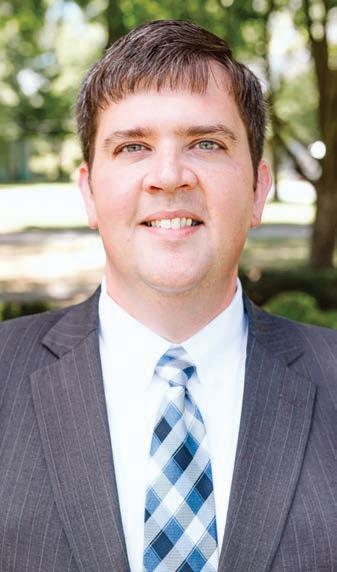


PCSSD offers students and staff access to schoool-based medical clinic


The Pulaski County Special School District (PCSSD) offers students and staff convenient access to medical care during school hours with the Mainline Health School-Based Health Center (SBHC). Located in the Mills Middle School Annex at 1205 E. Dixon Road in Little Rock, the SBHC provides comprehensive care including routine checkups, vaccinations and behavioral health services.
Mainline Marketing Manager Brady McDuffie answered questions about how the Mainline Health Center supports PCSSD families:
How can the Mainline Health School-Based Health Center help PCSSD families prepare for getting back to school?
The clinic offers vaccinations and immunizations to ensure students are up-to-date on their shots, physicals and sports exams to help students participate in extracurricular activities. It also offers health assessments to identify potential issues that might impact students' academic performance.
We also offer mental health support, including counseling and therapy services, to help students transition back to school and address any anxiety or stress related to the school year. We will be open for appointments and walk-ins on Wednesday, Aug. 6, and Thursday, Aug. 7, before school starts.
What are the greatest benefits of having a school-based health center for PCSSD families?
SBHCs play a vital role in supporting students' physical, emotional and academic success. One of the biggest advantages is increased access to healthcare for those who may not have access to it otherwise. Another major benefit is improved health outcomes. By addressing health issues early and on campus, SBHCs promote overall well-being.
Does being in a district with a school-based health center impact students academically?
Research suggests that students in districts with SBHCs often experience positive academic impacts. SBHCs help reduce absenteeism and increase graduation rates by addressing health issues that might otherwise keep students at home. SBHCs can also help reduce behavioral problems by addressing underlying health issues.
How can I make an appointment?
After you have completed the SBHC Consent Form, you can make an appointment online or over the phone at 501.234.2020. During the school year, the clinic is open from 7 a.m. to 4:30 p.m. Monday-Thursday and from 7 a.m. to 11 a.m. on Friday.
Parents can bring the child to the appointment, or you can use PCSSD clinic transportation. Co-pays will be billed to the parents following the visit. If a student does not have insurance, the clinic provides a sliding fee discount for those who qualify.

PCSSD is committed to creating a nationally recognized school district that assures that all students achieve at their maximum potential through collaborative, supportive and continuous efforts of all stakeholders.

By KD Reep • Photos by Makenzie Evans
In the rolling hills of Mount Vernon, Arkansas, the past is alive — not just in memory, but in music, swordplay and storytelling.
The Arkansas Renaissance Festival, founded by Patrick Taft, is fast becoming one of the state’s most beloved cultural events. With its immersive village, nationally renowned performers and deep commitment to education, it offers families and students a magical way to connect with history — and one another.
“We’re not just creating a festival,” said Taft, the owner. “We’re creating a place for families to make memories, a space where Arkansas can celebrate its own version of the Renaissance.”
After opening in 2024, the festival immediately racked up accolades from across the state. It was named a finalist in six categories in the Best of Arkansas Choice Awards — more than any other business or attraction — and even earned runnerup in Best Renaissance Festival in the Southeast, just ahead of Georgia’s 40-year event. Not bad for a festival that’s still in its infancy.

Set on 80 acres of scenic land, the Arkansas Renaissance Festival invites visitors to explore Dragonstone Springs, a permanent village with more than 60 structures, all built by hand in the last 18 months.
The site boasts eight unique stages, including an aerial arts platform, a puppet theater, and dedicated areas for Viking, pirate, troll and fairy-themed entertainment. More than $2 million has been invested to build the infrastructure, and guests might wander from a mermaid swimming pool to a Viking village, stop by the travelers’ camp or catch a show aboard a pirate ship.
More than 100 vendors and artists fill the grounds, selling everything from hand-forged blades to fairy wings. And the entertainment? It’s world-class. “We bring in professional acts from across the globe,” Taft said. “These are full-time performers — some of the best you’ll see anywhere in the country. We’re proud to bring that level of talent to Arkansas.”
Continued on page 71
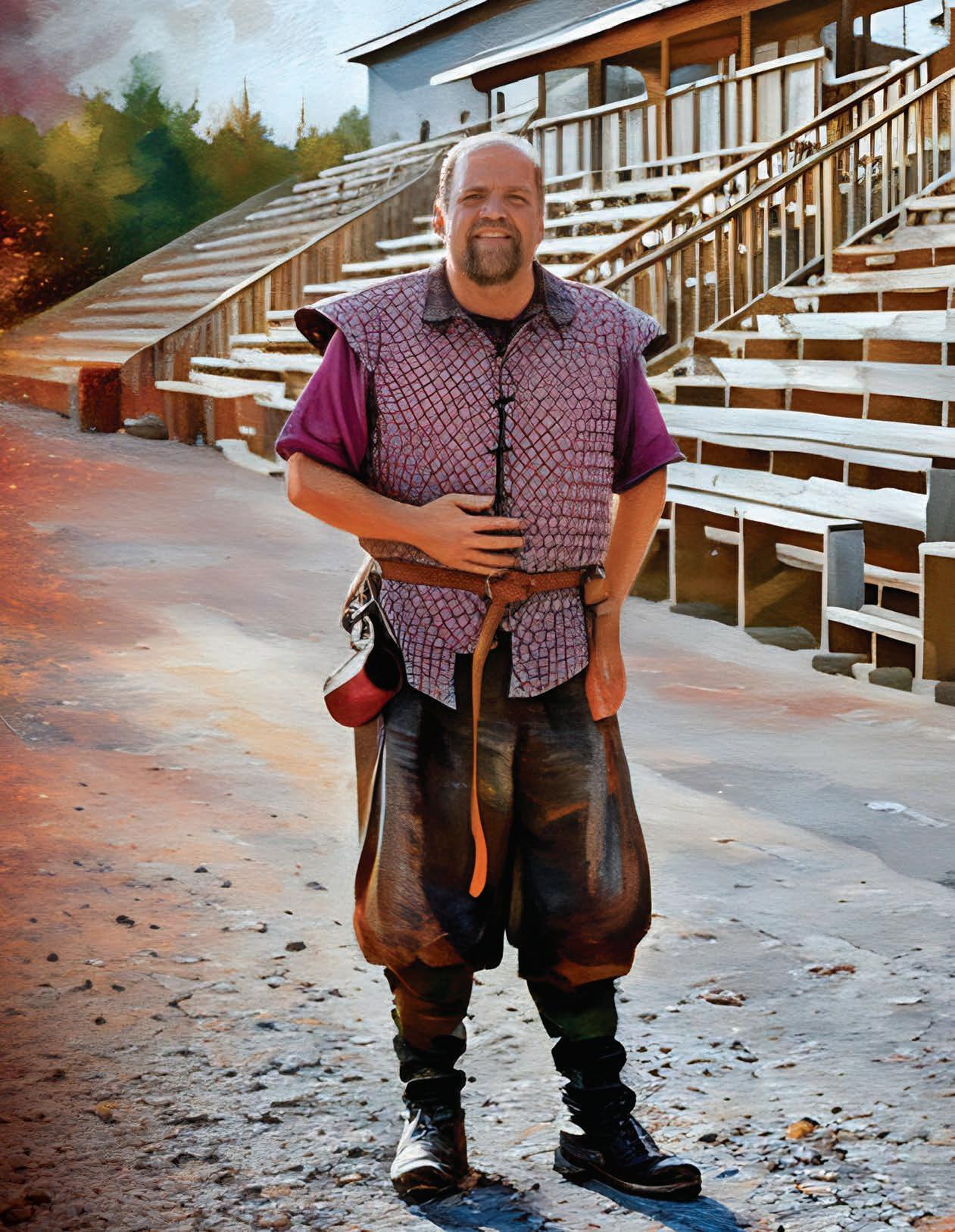

‘This is about more than costumes and turkey legs. It’s about building something real — a place where people feel wonder again, where they laugh together, where they learn. That’s the legacy I want to leave behind.’
— Patrick Taft, founder and owner



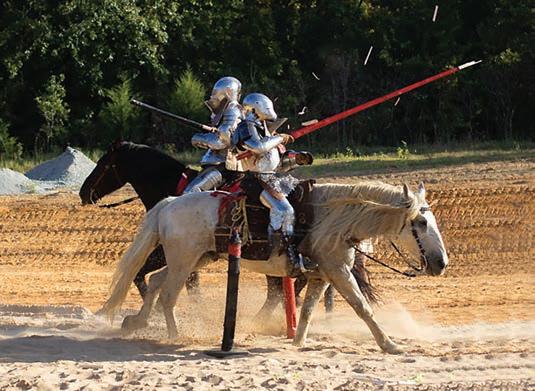


A standout feature of the Arkansas Renaissance Festival is its commitment to educational outreach. An inaugural Student Day Event is planned for Sept. 8 with discounted group pricing, this weekday event offers students an unforgettable opportunity to engage with the past. Highlights include: live combat demonstrations and scripted performances; artisanled workshops in blacksmithing, leatherwork and glassblowing; interactive activities like archery and storytelling; and historyfocused tours of the village and themed areas.
“We want to be more than entertaining — we want to teach,” Taft said. “History isn’t dry when you live it. That’s what we offer students: a chance to step into the world they’ve only read about.”
Although the festival is clearly Taft’s brainchild, he is quick to redirect praise to the people who've helped make that vision a reality. “There is absolutely no way I could do this alone,” he said. “It's the performers, the craftsmen — the volunteers, families, friends — who make this
place come alive. Their passion is what turns wood and paint into magic.”
That magic was on full display during the premier season, when families showed up in costume, sang along with minstrels, and cheered for knights during adrenalinepumping tournaments. While full-contact jousting remains a fan favorite, the variety of shows and activities ensures there’s something for everyone, from toddlers to grandparents. With every performance and every handmade structure, the sense of community grows. For many, the Arkansas Renaissance Festival is not just an event — it’s a tradition in the making. With season passes now available and momentum spreading across the state, the Arkansas Renaissance Festival is set to be a major fall fixture in Arkansas culture. The grounds will open again on August 30 for six weekends of merriment, with themed days, roaming entertainers, and expanded features in the works.
And yet, despite the rapid growth, Taft remains grounded in his original purpose: to bring people together through imagination, craftsmanship and history.
“This is about more than costumes and turkey legs,” he said. “It’s about building something real — a place where people feel wonder again, where they laugh together, where they learn. That’s the legacy I want to leave behind.”
To learn more about tickets, Student Day or vendor opportunities, visit arrenfest.com.


By Lori Dunn • Photo by Makenzie Evans
Since the Arkansas Scholarship Lottery was founded in 2009, it has raised $1.5 billion and funded more than 822,000 scholarships. The scholarships have helped thousands of students fulfill their educational dreams.
The lottery funds scholarships via ticket sales, and the Arkansas Department of Higher Education (ADHE) awards the scholarships. “Supporting students has always been the cornerstone of our mission at the lottery,” said Arkansas Scholarship Lottery Executive Director Sharon Strong. “We’ve seen for the past 15 years how Arkansans have benefited from the scholarships we fund, and we’re excited to keep up the good work. We’re able to help Arkansans pursue their dreams.
“It is rewarding to know that the work we do at the lottery helps students of all ages and backgrounds to succeed,” she said. “Everyone wins when students succeed.”
With more than 2,000 retailers statewide, the lottery is a massive, integrated team effort, Strong said. “Our sustained success comes from a united focus on our mission: maximizing net proceeds for scholarships in a responsible manner. From our gaming team, who ensures that we always have fun and engaging tickets available, to our sales department, whose representatives travel across the state day in and day out to assist our retailers, everyone plays their part in helping us achieve that goal,” she said.
The lottery has awarded more than $5 billion in prizes to players, more than $449 million in retailer commissions, and provided more than $186 million in state and federal tax revenue.
Continued on page 74

‘I pay for college completely on my own so every scholarship helps. It’s motivating to know it will help every year.’
— Savannah Bollinger, 19


Strong was appointed director of the Arkansas Scholarship Lottery, a division of the Arkansas Department of Finance and Administration, in July 2024. Prior to this position, she served as senior assistant attorney general to Attorney General Tim Griffin. “As director of the lottery, I get to wear a lot of hats. Legal adviser, legislative partner, business strategist, team leader and retail expert. It’s a unique mix that lets me tackle challenges from multiple angles, support smart decision-making and keep things running smoothly in a dynamic, high-profile environment,” she said.
Several scholarships are funded, and the eligibility requirements and deadlines vary for each. The most well-known scholarship is the Arkansas Academic Challenge Scholarship. It is available to both traditional and nontraditional students at two-year and four-year colleges. The deadline is July 1. “Regardless of whether you’re a high school senior or you’re re-enrolling after some time away, this scholarship is for you,” Strong said.
In addition to the Arkansas Academic Challenge Scholarship, the lottery also raises funds for the Arkansas Workforce Challenge Scholarship and the ACCESS to Acceleration program.
The Arkansas Workforce Challenge Scholarship is for students pursuing training in high-demand areas of healthcare, information technology and industry. The deadline is 30 days prior to the class start date. One of the scholarships, the Arkansas Concurrent Challenge, is intended for high school students taking college courses while still in high school. This program will be fully replaced with the ACCESS to Acceleration program by fall 2029. All lottery-funded scholarships have undergone changes following this year’s Arkansas legislative session. One change is an increase of the Arkansas Academic Challenge’s freshman award to $2,000, implementation of the ACCESS program, and the removal of the $800 cap on Arkansas Workforce Challenge awards via ACCESS.
“It is rewarding to know that the work we do at the lottery helps students of all ages and backgrounds to succeed,” Strong said.
The Academic Challenge Scholarship and the Academic Challenge Plus Scholarship have helped Savannah Bollinger, 19, achieve her educational goals.
She is a rising junior at Hendrix College. “It’s been super helpful. I pay for college completely on my own so every scholarship helps,” Bollinger said. The academic challenge provides varying amounts each year based on the institution and year of study. Bollinger said that has been a relief because she knows she will receive it each year. “It’s motivating to know it will help every year,” she said. The Academic Challenge Plus Scholarship provided additional funding based on financial need. Bollinger applied to a lot of schools outside of Arkansas but ultimately chose Hendrix. “I was accepted into about 40 schools and scholarships help narrow it down. Hendrix offered me a lot of scholarships and I like the smaller classes,” the student said. She grew up in Northwest Arkansas and was homeschooled until high school. Her graduating class only had 17 students. Bollinger is majoring in philosophy with a psychology minor. She is also considering a pre-law track. “Being a lawyer, that’s the dream,” she said.
The scholarships have made a difference for students all over the state. Corrigan Revels grew up in Waldo and Magnolia in the southern part of Arkansas. He received scholarships from 2011 to 2015 during his undergrad years. He earned a Bachelor of Arts in mass communication and a Master of Arts in higher education. Today, he is the Assistant Director for Student Leadership & Development at UA Little Rock.
“Outside of some private scholarships, I did not have any other scholarships to support me for all four years,” Revels said. “This kept me from taking out additional loans for school. Now that I am paying my loans back, I'm thankful that it is not a large amount of money that I owe.
“All students who seek to earn a college degree in Arkansas should apply for the scholarship,” he said. “It is very helpful, and the qualifications are reasonable for students who are willing to work for it.”
To learn more about the eligibility requirements for these scholarships or to apply, call ADHE at 501.371.2000 or visit sams.adhe.edu. For more information about the lottery, visit MyArkansasLottery.com. The Scholarships page on the website contains updated information regarding lottery-funded scholarships. It also features an interactive map that shares the scholarship breakdown by county, institution, number of scholarships and total funding as of 2024.
Continued on page 76






‘All students who seek to earn a college degree in Arkansas should apply for the scholarship. It is very helpful, and the qualifications are reasonable for students who are willing to work for it.’
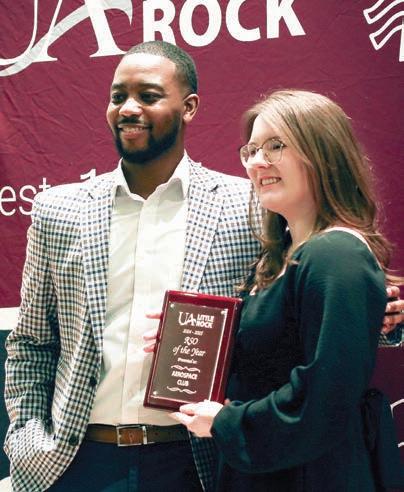

Perhaps a career in the tech industry seems more like a dream than a reality. Maybe you’ve built a web page or two from templates. Or maybe you’ve peeked at the coding behind certain elements and found yourself intrigued by what it all means, and how it translates into what you see on the screen every day. And while you’d love to understand it, or even create it, you may feel it’s beyond your reach. But is it?
You may be a perfect student for Arkansas Coding Academy (ArCA). If you’re looking for a career path or a career change, and if an IT career appeals to you, ArCA may be the answer. With some classes designed for beginners, previous technical experience is not required. If you are at least 18 years old with a high school diploma or GED, you may apply. If you have a genuine interest in technology, your background doesn’t matter.
Maybe you’re someone who has some experience in coding but wants to reach the next level. Great! ArCA meets students where they are and guides them to where they want to be. “Our primary focus is on web development, specifically full-stack web development,” said Alison Wish, Director of the Arkansas Coding Academy, University of Central Arkansas. “We teach our students all the essential components, including front-end and back-end development, as well as database management,” she said.
Why ArCA? Students of the program tout the school’s amazing instructors, how knowledgeable and helpful they are, and how easy the academy makes it to switch careers. The school doesn’t just teach coding, but also focuses on career development, offers flexible learning and in-person opportunities, and has an impressive career placement record.
Its instructors are practicing industry professionals who bring their real-world experience into the classroom. From day one, students learn how to apply their new skills on the job. Emphasis is placed on both technical and soft skills, so students are well-rounded and job-ready by graduation. “Our goal is to ensure our students graduate with not only robust technical skills but also the confidence and readiness to launch successful careers in tech,” Wish said.
The academy works closely with companies that hire tech talent, ensuring the curriculum meets the needs and demands of the industry as well as connecting students directly with hiring managers. ArCA’s fully virtual program includes live instruction and in-person events, so students build meaningful connections with industry professionals and peers. Further, the academy’s instructors are passionate about web development and dedicated to student success. Most of the instructors have more than 20 years’ experience in the industry and have trained hundreds of graduates since its inception in 2016, with 92% of students placed in tech careers within six months of graduation.
For their top graduates, ArCA’s Career Transitions program goes above and beyond the existing career coaching and workshops. This program offers more personalized one-on-one coaching sessions and specialized workshops designed to sharpen technical skills for up to six months after graduation. The goal is to empower graduates with the tools and support they need to succeed in their careers, ensuring they have every opportunity to thrive in their chosen fields,” Wish said.

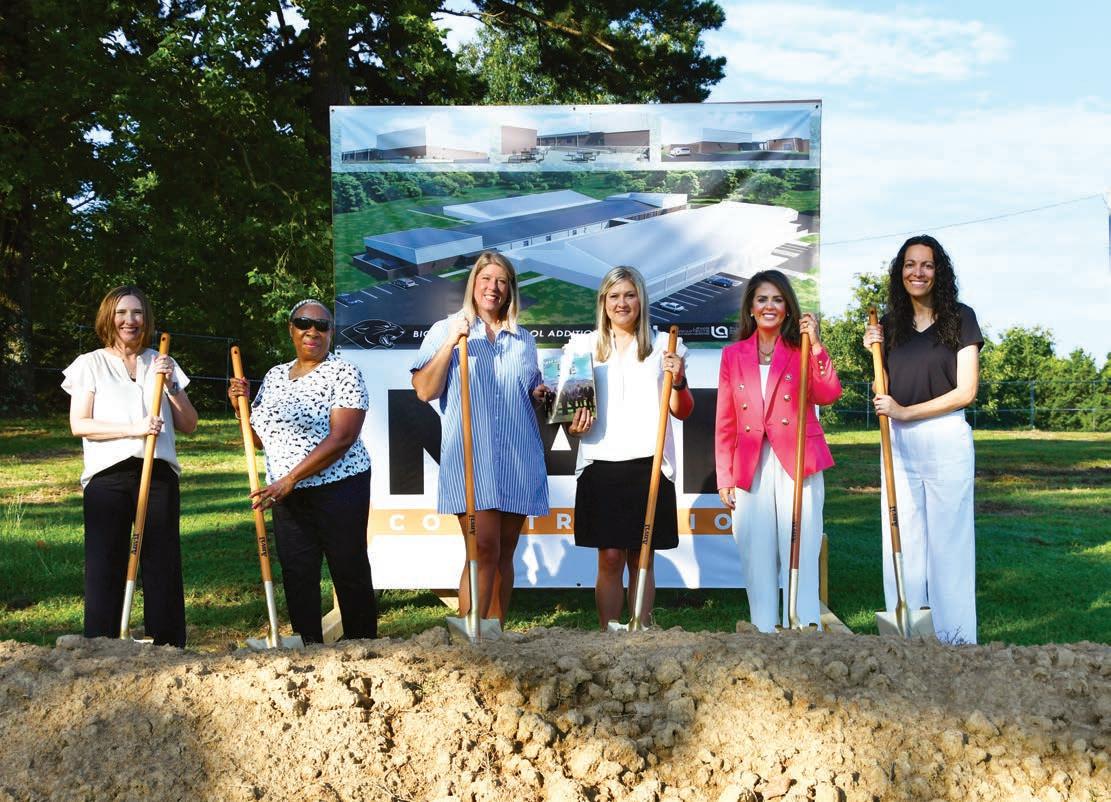
The East End School District in Bigelow (Perry County) recently announced a major milestone in its commitment to student success and community growth. Thanks to a $4.2 million partnership grant from the state of Arkansas, the district will soon begin construction on a portion of the high school to better serve its student population. The grant required a 58-year-old portion of the high school to be demolished in order to fund the new expansion being built in its place.

grateful for the state’s investment in our students and community,” Wilson said. “This project represents our continued focus on providing safe, modern and future-ready learning spaces—while being fiscally responsible.”
“This exciting project at Bigelow High School is made possible without any increase in local millage, ensuring taxpayers receive the benefits of expanded educational facilities without additional financial burden,” said Heidi Wilson, district superintendent.
Construction on the new high school addition is expected to begin this summer, with completion projected for July 2026. The updated facilities will include a new cafeteria and kitchen, several classrooms, labs, a safe room and a band room.


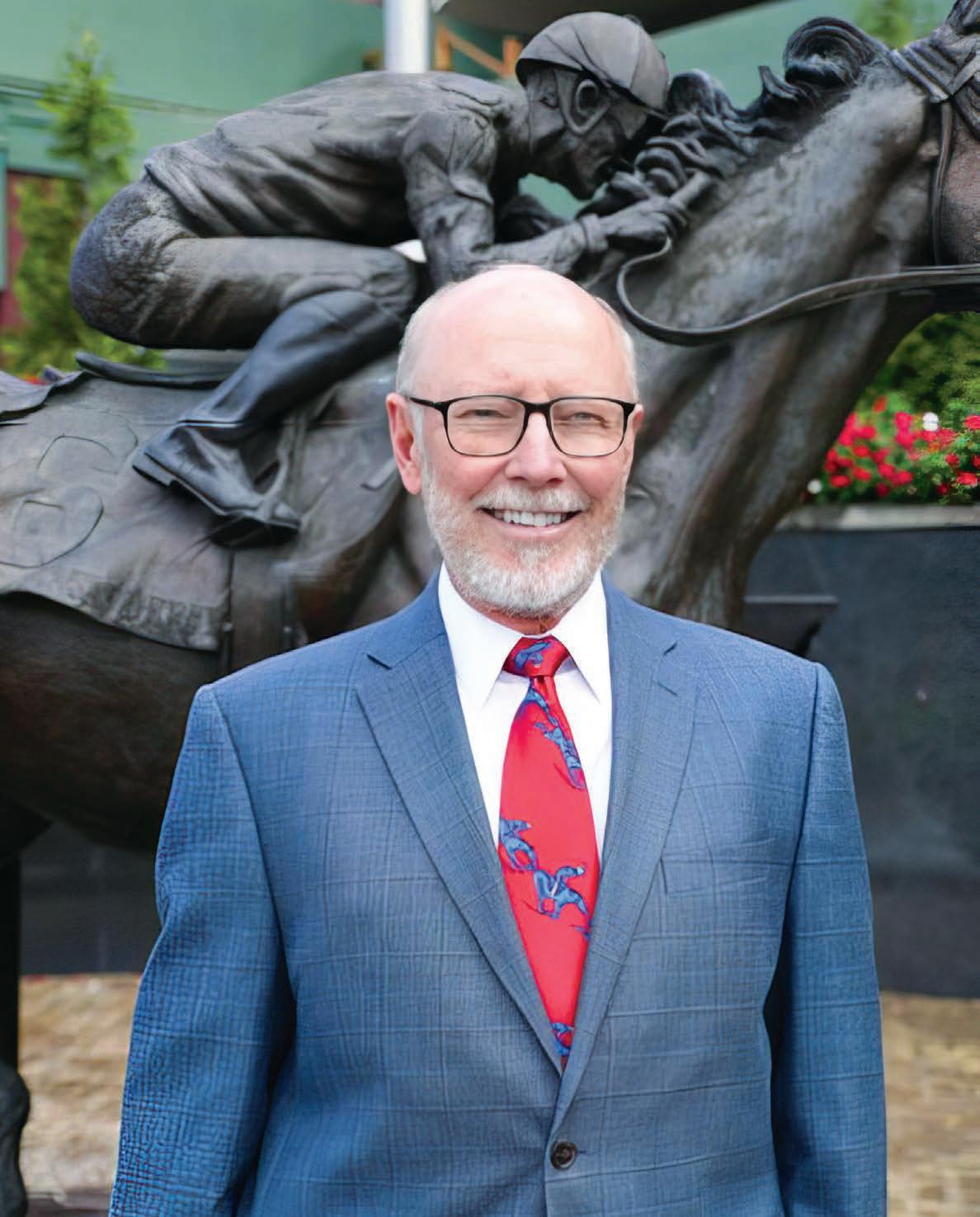
By David Grimes

Meet the man who has guided Oaklawn Park race track in Hot Springs in adapting with new products and services for almost four decades, helping the facility become one of the premier horse racing venues of the 21st century.
Jackson was inducted into the Arkansas Sports Hall of Fame (ASHOF) in 2024 as part of the 66th class, along with Carla Crowder, Glen Day, Al Flanigan, Butch Gardner, Jeff Glasbrenner, Ed Harris, Peyton Hillis, Ryan Mallett and Jason Peters.
Jackson was born in Hot Springs in 1950. After graduating from Hot Springs High School, he graduated in 1972 from Hendrix College, where he studied business and economics.
He became Oaklawn’s director of operations in 1978. He then served as general manager from 1987 until 2017, when he was named senior vice president. He has also been on Oaklawn’s board of directors since 1994.
In the late 1980s when I became old enough to legally place a bet, Oaklawn became a favorite place to go with friends and gather with Arkansans from all corners of the state. In those days, Oaklawn charged a nominal admission fee. It was $2 if I remember correctly. However, the track provided passes that were mainly given to state legislators to dole out to constituents. So, if you could get your hands on one, you felt like a bigwig flashing it to the person working the gate even if it did only save you a couple of bucks.
Continued on page 82


Founded in 1904, Oaklawn survived the Great Depression and two world wars. But as the 1980s were winding down, the racetrack began facing new challenges that threatened its very existence. Lotteries and casinos began popping up in neighboring states, siphoning off a large number of patrons and their betting dollars. Tunica, Mississippi, became the hot new destination for my friends and many other Arkansans to go for both gambling and entertainment.
So Oaklawn had to get creative, and this is where Jackson stepped up. In 1989, they convinced the state legislature and then the local voters to allow Sunday racing, which gave more people around the state another weekend opportunity to make the drive to Hot Springs to enjoy a day at the races.
They then expanded into simulcast racing. This allowed patrons at Oaklawn to wager on live races at other tracks, while also allowing bettors at other tracks to gamble on races at Oaklawn. Eventually, thoroughbred races run in Hot Springs were simulcast to more than 1,000 locations in North America. However, the Holy Grail was historic racing. Better known as instant racing, this allows players to bet on random races that have already occurred. Many had tried and many had failed, but Jackson figured it out and was actually awarded a patent for it. Introduced in 2000, it revolutionized Oaklawn and put it on a path to be among the most successful racetracks in the United States.
In 2005, casinos in Arkansas were still illegal, but a public vote allowed Oaklawn to expand into what were called “electronic games of skill,” which was basically video poker and blackjack. So in 2008, the racetrack added a “casino,” which was immediately a tremendous success, attracting new visitors and new money.
This new money from these new revenue streams allowed Oaklawn to increase the purses on the thoroughbred races, attracting better horses and better trainers and better jockeys, thus attracting more bettors.
So while many other tracks around the country were still in decline, Oaklawn was rising to new heights in the world of thoroughbred racing.
In 2018, a ballot amendment finally allowed Oaklawn to operate a full casino, and it is now officially known as Oaklawn Racing Casino Resort. Jackson has been at the forefront of all these innovations. His ingenuity not only earned him a place in the ASHOF, but he was also inducted into the Arkansas Business Hall of Fame in 2024. Jackson has also found time to be involved in his community, serving on numerous boards over the years, including St. Joseph’s Hospital, the Hot Springs A&P Commission, the Garland County Economic Development Corporation, the Governor’s Advisory Commission on Hot Springs National Park and the Arkansas State Chamber of Commerce.
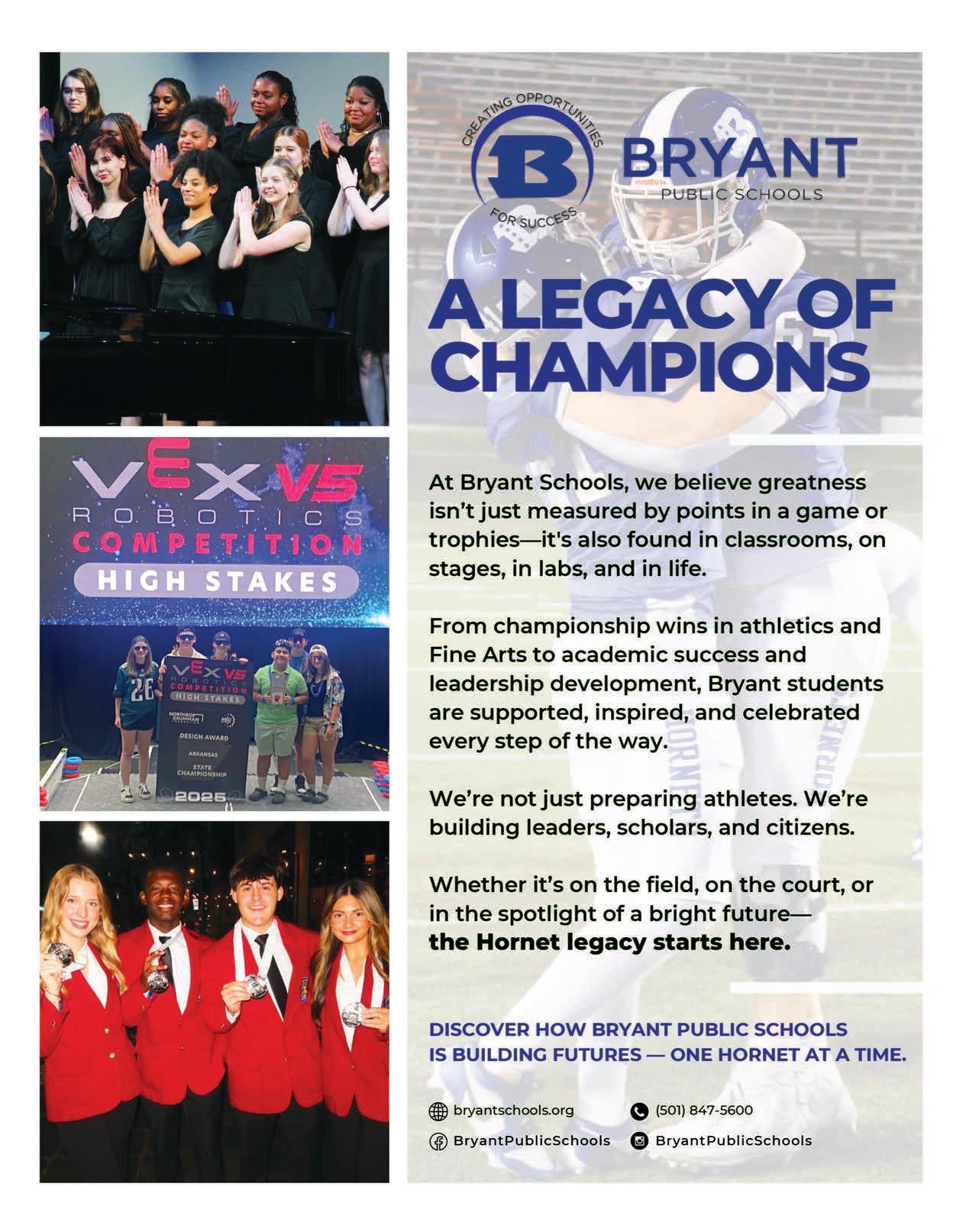
By Stefanie Brazile • Photos by Jeromy Hunt, Jr.
The sound of children laughing was restored at Fifth Avenue Park in Conway on June 8 when spiritual and civic leaders hosted “Rise at 5th Community Bash,” which was attended by more than 400 people. Mayor Bart Castleberry and Pastor E.C. Maltbia, founder of True Holiness Saints Center, joined with community stakeholders to launch the Changing the Narrative Initiative, focused on uplifting African American males through mentorship, access and positive visibility.
Nearly two months after a shooting at the park tragically took the lives of two adults, injured nine others and shocked the city of about 70,000 people, leaders are working to restore the public’s trust in the park as a safe place for families to visit. The program included a moment of silence for the victims. Community members greeted one another and embraced, recognizing the importance of moving forward together.
“This was an unforgettable family-friendly event with food, games, music, speeches, local talent and inspiration,” Maltbia said. “The Changing the Narrative Initiative was launched during our kickoff event at a day of hope and healing for the community.”
Changing the Narrative Initiative will continue to partner with stakeholders from across Conway. Maltbia and other leaders are working on a podcast and a mental health summit.
“It was great to see people from all walks of life with a shared sense of community and a shared goal of changing the narrative,” Castleberry said in a written statement. “This event was a positive step in the right direction, and I look forward to good things to come from the initiative.”
Children had fun in the bouncy house, participated in the crawl, drag and squirt activity with firemen, and played on the splash pad and playground equipment. There was positive music from DJ Dooley, performances by local talent, a free meal ticket for the first 300 attendees and a high police presence.
“It was great to see the community come together at Fifth Avenue Park for its intended purpose, which is providing a safe venue for individuals and families to gather for fellowship and fun,” said City Councilman David Grimes.
Maltbia has a plan for the Changing the Narrative Initiative to succeed, which includes listening to one another to understand perceptions and lived experiences; working together to build a diverse coalition of strategic partnerships; and hosting positive community events to bring the Conway community together to tear down walls of discord and build bridges of unity.
“When our city comes together, healing happens,” he said. “We are Conway strong!”
‘When our city comes together, healing happens.’
—
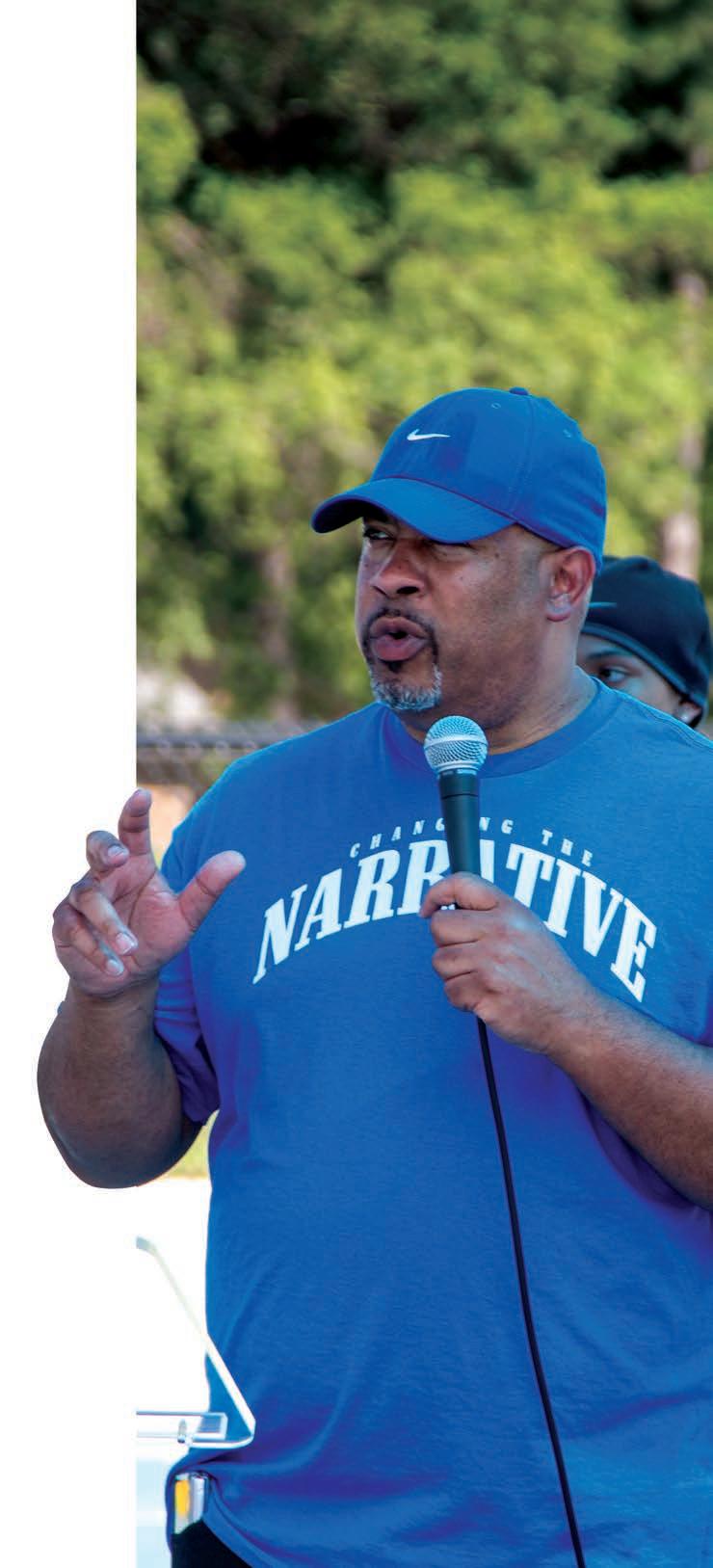





By Vivian Lawson Hogue
My first-grade experience was what I hoped it would be. My first six years had been spent around my four brothers and neighbor boys from the Brannan, Spatz and Malpica families. I could hardly wait for my turn to go to school where there would be other girls. My parents couldn’t afford to pay for kindergarten, so it was just “me, myself and I” until school age. We three got along well, though. After another year, school held good times, such as playing jacks, pick-up sticks, hanging upside down on the monkey bars, smelling crayons and pencils and the linseed oil on the old wooden floors. Open windows brought in the aromas of burning trash from paper, limbs from the playground and leaves in the fall.
One day, we had an impromptu writing lesson. Mother had bought a coat for me, and I was ecstatic because most of my clothes were homemade. It was burgundy with a hood. I mentioned it so many times that our teacher, Mrs. Sharp, had everyone get a sheet of Big Chief paper and write “Vivian’s New Coat” at the top of the page.

We were to describe it and say something nice about it. I can’t express what it did for my ego! It also shut me up. Arithmetic was next, though, and my ego was deflated again. In fact, this condition returned during all math classes until I received my college degree in, of all things, education.
Through the years, I became interested in how education began in America. This was partly because of the one-room schoolhouses in which my parents taught. They were born in the turn of the century in 1900 and 1901, so I was privileged to know details.
It always seemed important for society to have knowledge. The value of early educational environments would progress to local governing districts and teacher qualifications. Out of them would eventually come the titans of business, education, medicine,
invention, art, sports, farming and churches. In fact, churches were often classroom locations until a school could be built.
Early schools were typical in design and function. Most were frame or log structures with the exception of some fortunate enough to have rock sources. There was a front door and two or three windows on each side. Students faced a blackboard, which was normally a smooth wall surface painted black.
During spelling bees, each student stood at a chalk line on the floor and misspellers would have to move to the last line and work back up (thus the phrase “toe the line”). Competitive spelling bees sometimes created great rivalry between schools.
Deskwork writing was done on slate tablets with slate pencils. My mother’s 119-year-old slate is about the size of notebook paper. Students erased using a damp cloth or well-aimed spit and a shirtsleeve (thus the phrase “start with a clean slate”). The two genders sat on opposite sides of the room, and recess games were often played in male and female groups, which they preferred.
With no need for custodians, daily upkeep was done by the teacher and students. They carried wood for the wood stove, added wood and stoked the fire, refilled the water bucket, and dusted. A bucket of water and dipper for drinking was at the back of the room, with everyone drinking from the same dipper. Indoor restrooms were nonexistent, but somewhere downwind there was an outhouse. .


A larger one was built in 1893 at Davis and Prince streets. A two-story red brick building replaced it in 1909. A new white brick senior high was built in 1937. The Ellen Smith school was built on Harkrider in 1925, and Pine Street school was constructed in 1952.
From these strong roots, it is no wonder that three colleges were located in Conway, Arkansas, a town which gained the nickname “Little Athens.” While we didn’t expect that era, we will never forget our own Dick, Jane, their dog, Spot, and Puff the cat. See them run, run, run!


By Beth Jimmerson
In a world dominated by smartphones, AI assistants and instant messaging, the humble landline phone is making an unexpected — and undeniably cool — comeback.
Yes, you read that right. The landline is cool again.
That clunky, corded staple of 1980s kitchens and 1990s teenage bedrooms is ringing its way back into relevance. But this time, it’s not just about practicality — it’s about nostalgia, simplicity and creating intentional spaces in an increasingly digital world.
There’s something romantic about a landline phone. Maybe it’s the satisfying click of the receiver, the coiled cord you can twist while talking or the way conversations feel more focused when you’re tethered to a specific place in the house. Landlines remind us of a time when phone calls mattered — when you didn’t scroll through texts mid-chat or forget why you called in the first place.
Today, vintage-inspired landline phones in candy-colored plastics, rotary-style dials and even wall-mounted designs are popping up in
trendy home offices and living rooms. They’re conversation starters, aesthetic throwbacks and functional tools all at once. For some, owning one is an ode to the past. For others, it’s an intentional step back from the fast-paced tech overload.
Beyond the retro charm, landlines are also finding a new audience: kids who aren't quite ready for a smartphone. Parents are rethinking the idea of putting a powerful internet-connected device into the hands of their 8-year-old. A landline offers the perfect solution — it gives kids a way to talk to grandparents, friends or call for help in emergencies without the distractions, pressures and risks of social media or screen addiction. It’s communication, plain and simple.
Even better? You always know where it is. No digging through couch cushions or under beds — the landline stays put, making it easy for kids (and parents) to find it in a pinch. And because it’s stationary, it encourages communication to happen in shared family spaces rather than behind closed doors.
Some parents find comfort in giving kids their own dedicated line, allowing friends or family to reach them without having to borrow mom or dad’s phone. It provides a sense of independence while still being firmly grounded in the safety of the home.
One of the biggest draws of bringing a landline back into your life is its ability to support tech boundaries. Landlines let you disconnect from screens without disconnecting from people. Want to unplug for dinner or enforce a no-phones policy in the living room? A
landline gives you a way to stay reachable without the temptation of notifications, apps and endless scrolling. It’s a small shift that can make a big difference — helping families recharge, reconnect and be more present in the moments that matter.
In fact, many families are creating “tech-free zones” in their homes, where smartphones and tablets are left behind — but the landline remains. It becomes the bridge between staying connected and staying present. Whether it’s a quiet Sunday afternoon, family game night or a school-night routine, the landline supports a slower pace and more intentional living. It’s a quiet rebellion against the alwayson culture — and a reminder that not all connection has to come with a screen.
With a landline, conversations slow down. You're less likely to multitask or stare at a screen while someone’s talking. You hear each other better. You laugh more. You linger. And for many of us who grew up sprawled across the floor with a phone wedged between shoulder and ear, that feeling of connection is something worth rediscovering — and sharing with a new generation.
Landline calls also carry a certain charm — no video, no filters, no pressure to look a certain way. Just voices, stories, pauses and laughter. It’s a form of communication that feels deeply human in all the best ways. In a time where digital connection often feels shallow or rushed, the landline creates
space for real conversation — the kind that sticks with you long after the receiver is hung up.
Today’s landlines aren’t necessarily tied to copper wires either. Conway Corp uses VoIP (Voice over Internet Protocol) technology, offering modern features like caller ID, voicemail to email, and even wireless handsets — all while keeping the vintage vibe alive.
Whether you pick up a working rotary model for your kitchen wall or a sleek cordless unit for your child’s room, landlines are proving they still have a place in the home — not as relics, but as real tools for building thoughtful connections.
As technology races ahead, the landline reminds us to slow down and savor simple joys — like hearing a loved one’s voice echo down the hallway or watching your child giggle on their first real phone call. It’s more than just a phone; it’s a connection point, a memory-maker and a quiet anchor in a noisy world. And sometimes, bringing a little old-school into the mix is exactly what modern life needs.
So maybe it’s time to plug in a piece of history and make the landline part of your family again. Because cool isn't always about the newest thing. Sometimes, it's about bringing back what really mattered all along.


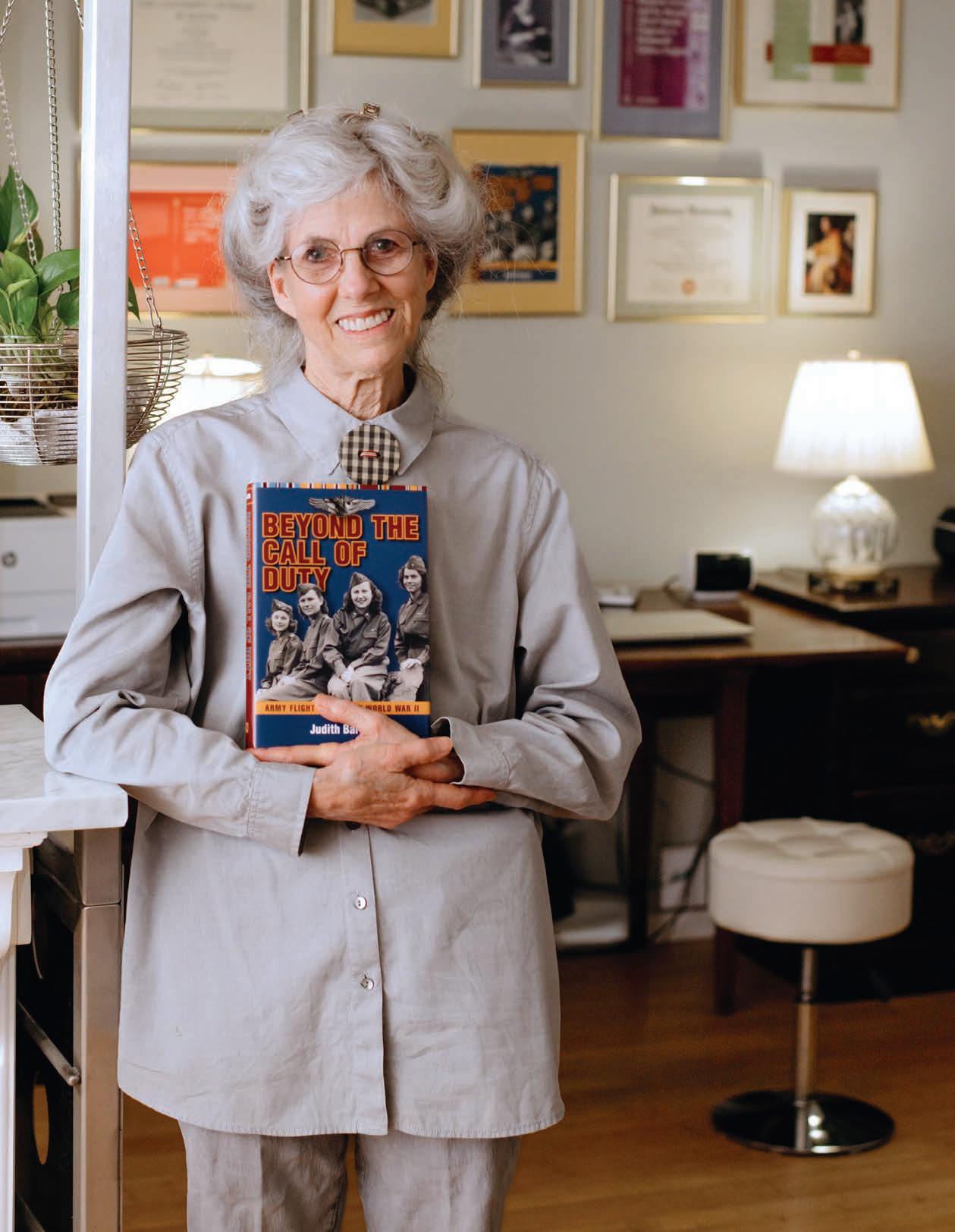
It takes a special kind of person to leap into danger to help others. And it’s even more remarkable to be the first group to do so from the skies during wartime. That’s exactly what Judith Barger of Little Rock highlights in her book “Beyond the Call of Duty: Army Flight Nursing in World War II.”
Her work tells the stories of 25 of the first 500 U.S. Army Air Force’s flight nurses — trailblazing women who, during World War II, were trained in everything from crash procedures to highaltitude physiology. These women weren’t just nurses. They were survivalists, innovators and quiet heroes.
The first class of flight nurses began training at Bowman Field in Kentucky in 1943. By the time the war ended in 1945, they had helped evacuate more than a million patients from battlefronts across Europe and the Pacific. Their missions were often perilous, navigating enemy fire, mechanical malfunctions, and limited medical supplies, but they also had moments of joy, laughter and even romance. Often, they were the only women among hundreds of men. They had to be resourceful and brave.
One online reviewer said the book was “wonderfully written, interesting, and informational.” Another online reviewer wrote,“I enjoyed that it is complete with maps, photos, and even cartoons. I highly recommend reading it.”
Barger, herself no stranger to military service, drew inspiration for the book from her career in the Air Force. A proud Arkansan, she grew up in towns across the state, including Crawfordsville, Monticello, Blytheville AFB, Lepanto and Jonesboro. After attending Hendrix College for two years, she earned her nursing degree at Emory University in 1971. She joined the Air Force shortly afterward and became a flight nurse, motivated, in part, by the very women whose stories she would later tell.
From 1973 to 1975, she served in the Philippines with the 9th Aeromedical Evacuation Group during the final stages of the Vietnam War. It was a defining moment in her military career. During her 20 years of service, she earned the rank of lieutenant colonel and attained her master's and doctoral degrees. The seeds of “Beyond the Call of Duty” were planted during her doctoral work at the University of Texas in 1986. With the number of surviving

World War II flight nurses dwindling, Barger raced against time to record their stories. In just six months, she located and interviewed 25 nurses.
After retiring from the Air Force, she knew she needed a creative outlet. Always an avid reader and writer, she returned to school to pursue her early passion for music. She earned a second Ph.D. in musicology from Indiana University in 2002. Her dissertation work led to the publication of her first book, “Elizabeth Stirling and the Musical Life of Female Organists in Nineteenth-Century England.” That book was later followed by “Music in The Girl’s Own Paper: An Annotated Catalogue, 1880–1910” and “The Nurse in History and Opera: From Servant to Sister.”
Her research has gained international recognition — so much so that the Imperial War Museum in England requested her original interviews with the flight nurses. The reel-to-reel recordings, now digitized and publicly accessible, have become a valuable resource for families and historians alike. “I promised these women their stories would be heard,” Barger said. “Hearing from their families after they listened to the recordings means the world to me.”
Today, she continues to live and write in Little Rock. She maintains a website, judithbarger.com, where visitors can find her blogs, a list of awards and links to the digitized interviews. And she isn’t done yet. A new book focused on flight nurses during the Korean War is in the works.
Last year, she represented WWII flight nurses at the Women in Aviation International Conference in Orlando and will soon speak at an event in Oshkosh, Wisconsin, where she’ll share her personal experience with Operation Babylift at the close of the Vietnam War. Barger exemplifies what it means to be a lifelong learner. She continues to shine a light on women’s contributions in both military and music history, bringing untold stories to light. Through her books and speaking engagements, Barger continues to honor the legacy of the courageous women who paved the way for future generations. But perhaps more importantly, she is leaving an important resource for others to learn from as well.
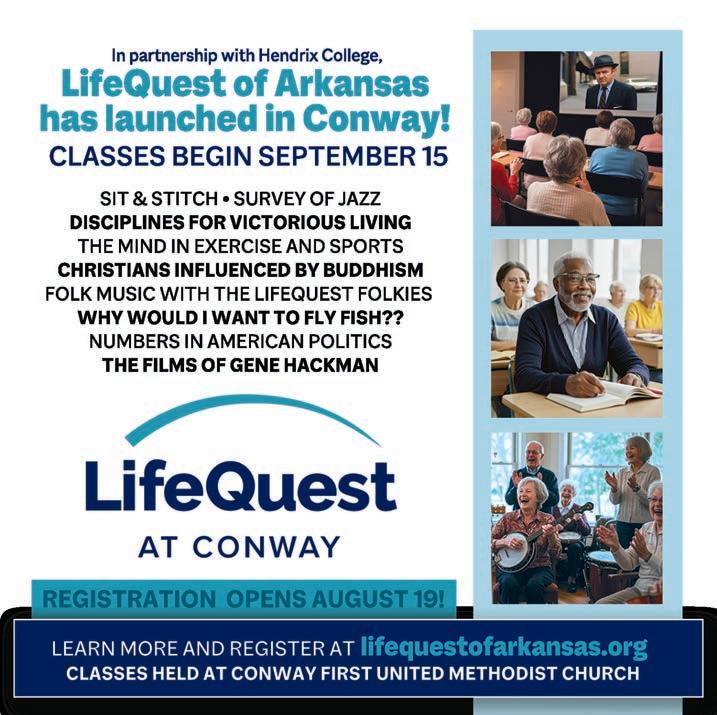


501 family has been trusted to professionally photograph students for almost five decades
By Stefanie Brazile
Strain Photography of Conway has captured the smiles of Conway Public Schools (CPS) students for nearly 50 years and makes a significant donation back to each school annually.
Jackie Strain-Mahar and Brandy Strain-Dayer witnessed their father’s passion for photography and learned the art form by practice and osmosis. When he retired, they continued his work — some would say it was their destiny. Today, they operate Strain Photography, carrying forward Gary Alan Strain’s dream to freeze time for families in beautiful, interesting and fun settings.
The pair welcomes clients into their busy studio downtown, meets them at places that are special to the person, and they also take photos of faculty and students at all Conway Public Schools.
Continued on page 96


“Dad was a teacher for 10 years before he and Mom started a fulltime photography business,” Strain-Mahar said. “Because of his close relationship with school administrators, he started taking the school portraits, and our mom, Nancy, was a huge part of the success of the business.”
Until digital photography emerged, Nancy completed all the darkroom work for Strain Photography. Darkrooms were invented in the early 19th century to process film and make prints. They are not as crucial because of digital and instant photography, but the skillset was essential for decades. The sisters credit their mom as being their number one cheerleader to this day.
It is commonly part of a school photographer’s contract to give a percentage of their total sales to the school after they deliver all the orders. The more that parents love the photos, the more they purchase, which increases the donation. Strain Photography has been successful in pleasing parents for nearly 50 years, and they donated $42,053 to CPS schools for the 2024-25 school year.
“The principals are always so excited when we show up with the checks!” Strain-Mahar said. “One even looked at the check and was like, ‘Are you sure this is right?’ They were so thankful to get that money to help with extra projects and fun things for the kids!”
The Strain family has played a meaningful role in Faulkner County for decades, and they are local VIPs. “School picture day is such an exciting day for kids,” Strain-Dayer said. “For many kids, it’s the only time they are professionally photographed. We like to have fun with them. I love it when I’m at the grocery store and have a Strain logo shirt on and see kids in the store tell their adult, ‘That’s the school picture lady.’”
In addition to traditional yearbook photos, the sisters also visit the schools multiple times each year for faculty group photos, sports team photos, class group photos and spring portraits. They also capture the moment when the graduating class receives their diplomas.
Strain-Mahar and Strain-Dayer started the process again in July when they began photographing the class of 2026 for their formal yearbook portraits and cap and gown photos. As they carry forward the torch that their parents lit nearly 50 years ago, the Strain sisters are excited to be part of the lives of CPS students through photos and donations to their schools.

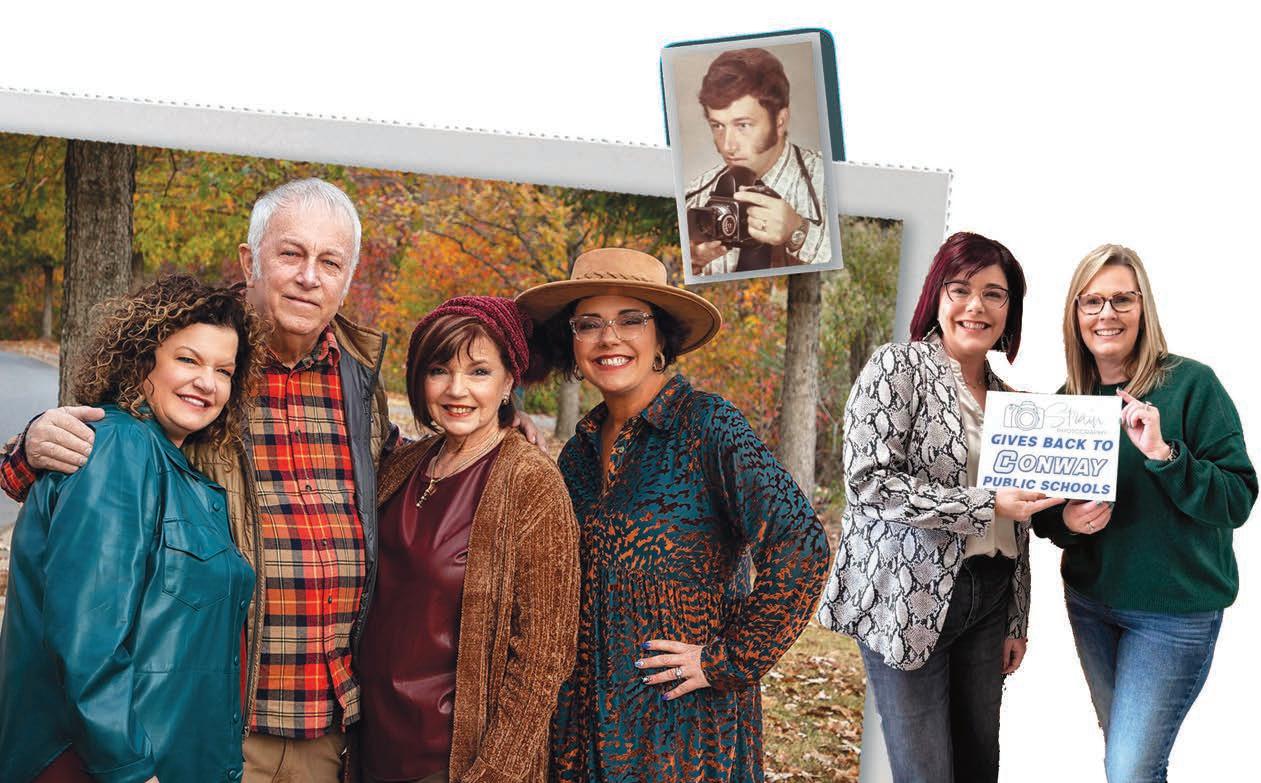


By Laurie Green
There was a time when back-to-school season meant I was knee-deep in lunchboxes, permission slips and kids arguing over who got to ride in the front seat. With seven children — two sets of twins included — our back-to-school routine looked less like a peaceful transition and more like an obstacle course with caffeine, off-brand Pop-Tarts, lost shoes and a whole lotta Jesus.
But these days? I get to watch the madness unfold from my cozy grandma perch, coffee in hand, slippers on and the deep satisfaction of knowing … it’s not my circus anymore — it’s theirs. I still remember it vividly. The smell of fresh crayons. The sound of someone crying because their sock seam felt funny. The backpacks I packed, finding hidden off-brand Pop-Tarts in their favorite flavors, so we always had crumbs everywhere! Off-brand Pop-Tarts were what I called breakfast. Shoes were another constantly lost item that was never where I left them. My house was complete chaos, and somewhere in the middle of it, I learned that grace often looks like showing up sticky and sleep-deprived and saying, “Let’s try that again.”
Now, I get texts like:
— “Mom, how did you survive this?”
— “These kids are feral. Did I do this to you?”
— “Would you like these grandkids of yours for the night?”
Survive? Honey, I didn’t survive — I was completely winging it. We survived on desperate, scattered prayers with one hand while microwaving chicken nuggets with the other.
Back then, I didn’t have Pinterest or parenting influencers. I had instincts, a laundry mountain that could be seen from space, and the unshakable knowledge that God was walking right beside me — usually laughing.
And don’t even get me started on fashion emergencies. I once dropped Brittainy off for school in a sweet little winter outfit — leggings, sweater, the whole deal. By pick-up? She was strutting out in plastic high heels, a belly shirt she had “custom-painted” with markers, and a pair of shorts that hadn’t fit her since preschool. In January. I didn’t know whether to scold her or nominate her for “Project Runway: Recess Edition.”
God bless those teachers.
Seriously, watching your kids parent is comedy, karma and pure joy all rolled into one. These days, I’m the calming voice on the other end of the phone. The prayer warrior on the sidelines.
The story-spinning, wisdom-dropping survivor of a family we built out of nothing but love, grit and “we’ll figure it out.” Backto-school still brings tears — but now it’s because I get to watch my blessings multiply.
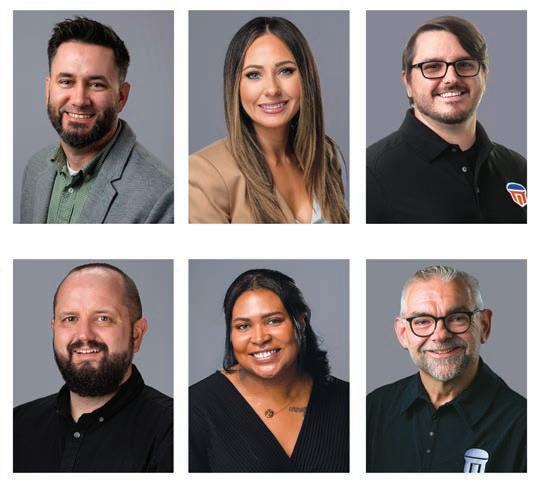
T
he Conway Corp Video Production and Local Programming Department won a Bronze Telly Award in the Sports – General category for outstanding coverage of Wampus Cat Football.
Department Manager Jeff Matthews, senior production coordinator Wayne Bailey, production coordinators Ashtyn Brown and Javan Massey, along with part-time Channel 5 sports announcer Levi Gilbert and parttime production team member Justin King, were also recognized for their contributions.
The Telly Awards, founded in 1979, honor excellence in video and television across all screens and are judged by leaders from video platforms, television, streaming networks and production companies, including Netflix, A&E Networks and ESPN. With thousands of entries from across the globe each year, the Telly is a prestigious recognition in the world of broadcast and digital media.
“Our production team puts their heart into every Wampus Cat Football broadcast,” Conway Corp Chief Marketing Officer Crystal Kemp said.
“Winning a Telly Award is an incredible achievement and a reflection of their dedication to telling our community’s stories with professionalism and pride.”
Conway Corp’s studio production team consistently produces highquality local content from live sports to community features designed to keep residents informed and connected.
The award-winning Wampus Cat Football coverage shows not only the talent of local athletes, but also the commitment of the crew behind the scenes who bring the excitement to life for viewers at home.
Residents can watch Wampus Cat Football and other local programming on ConwayCorpTV Channel 5 or at ConwayCorp.com/Channel5.

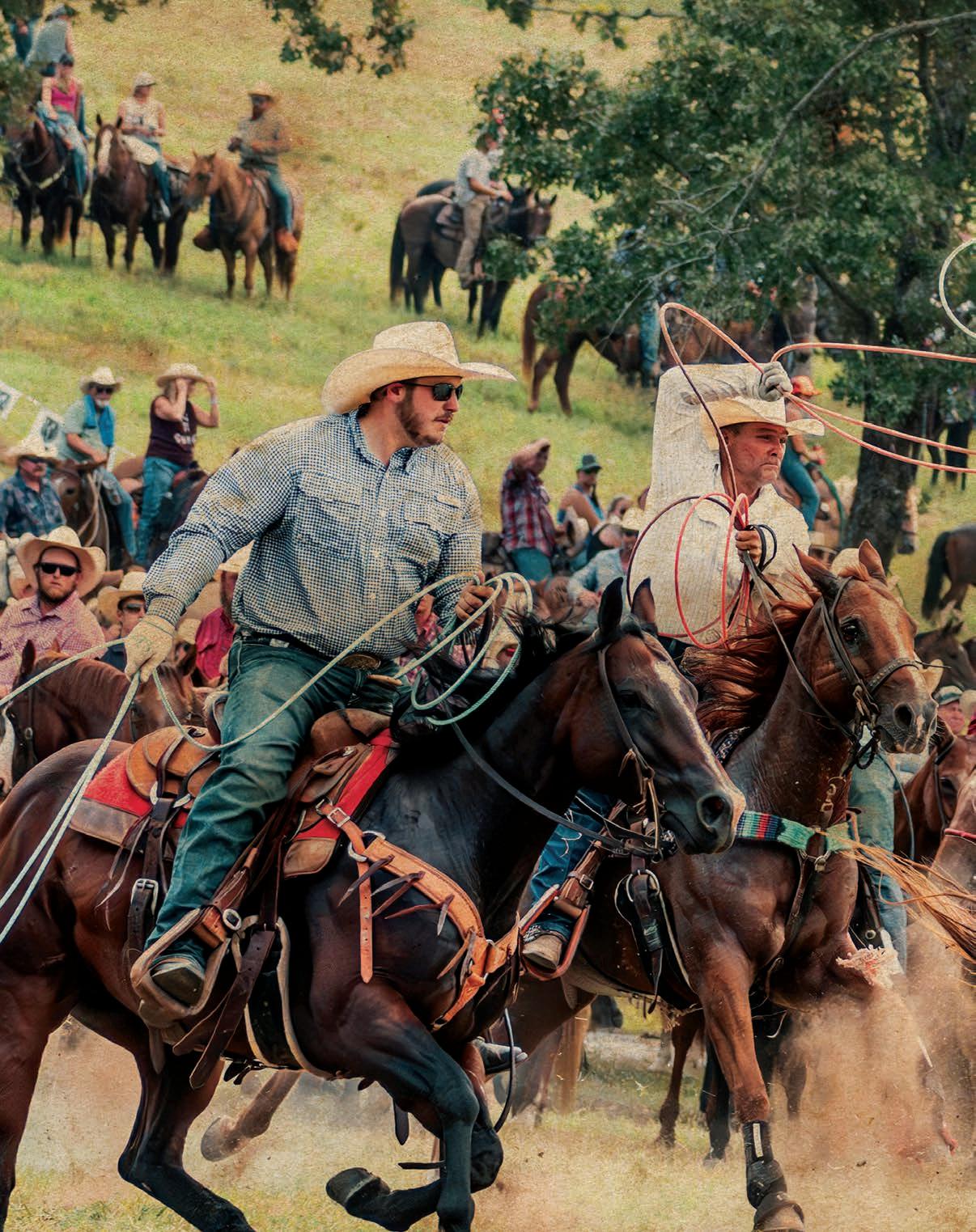
More than 20,000 make their way to 501 for 40th Annual National Chuckwagon Races

Continued on pages 102-105
As the end of summer nears and Labor Day approaches, an alltoo-familiar energy charges the Clinton community. This year the air is surging with anticipation of the 40th National Championship Chuckwagon Race.
Well before the start date, the area begins preparing for convoys of trucks and trailers hauling horses, wagons or campers. Primitive campers prepare to erect a temporary homestead on their designated camping spot. Vendors are busy preparing to serve a crowd of contestants and spectators, projected to be around 20,000, who will gather on the Bar OF Ranch. Soon, the charged air will crack into a bolt of activity, followed by a rumble of thundering hooves and rolling clouds of dust.
Festivities officially begin Saturday, Aug. 23, and continue through Sunday, Aug. 31. But long before the opening gunshot signals the start of the first chuckwagon race, the town and its visitors are captivated by the camaraderie and romanced by the nostalgia of the cowboy spirit and revered traditions of the Old West.
When Dan and Peggy Eoff of Clinton hosted the first chuckwagon race at the ranch in 1986, they never dreamed it would grow into the legendary event it is today. What started as a weekend of fun among friends with eight teams has grown into nine days of festivities and boasts close to 200 teams. It is touted as the largest gathering of horses in the state and among the largest in the nation.
“I remember after the first one we had, one of our friends had gone to a trail ride in Missouri. He said there were like 600 horses there. I’d never seen 600 horses, but I said then that one day we were going to grow to 2,000 horses. Last year, we had 5,200 horses,”
Peggy said. “We’ve had as many as 5,700.”
Most of the teams come from the Midsouth: Arkansas, Texas, Louisiana, Oklahoma and Missouri. However, the event has drawn teams from Indiana, Kentucky, Tennessee, Mississippi and even as far east as South Carolina.
For those unfamiliar, a chuckwagon race is a spectacular event to watch. Teams consist of a driver at the reins of a team of horses hitched to a chuckwagon, a cook, and an outrider. The wagons resemble the Old West chuckwagons once used as mobile kitchens equipped to carry food and supplies on cattle drives.
The dismounted outrider, holding the reins of his/her horse, is positioned behind the chuckwagon with the cook. With a gunfire start, the cook must toss a box (representing a cookstove) into the bed of the chuckwagon, run to the front of the wagon and get himself seated alongside the driver before the team of antsy horses bolts into action. The outrider must then toss a tent (resembling a bedroll) into the wagon and mount the horse that is hyped up with anticipation. The mounted rider must then race past the chuckwagon running at break-neck speeds to cross the finish line
ahead of the wagon. Despite rough bounces, bumps and hard turns on the course, the chuckwagon must cross the finish line without losing its cargo or passengers. It’s a dirt-flying, nail-biting, heartstopping, breath-holding, adrenaline-pumping good time.
The Eoffs were quick to point out that this is not a professional competition. “We didn’t want this to be a professional event. It’s not about earning money. For us, it’s all about the performance,” Peggy said. No entry fee is collected from the teams, so there is no cash money awarded. Winners earn buckles, trophies and chuckwagon bucks to use with vendors on site or at participating businesses within the community. “So, if you lose, you didn’t lose anything and you had a good time,” she said.
Beyond the races, attendees can enjoy a full schedule of westernthemed activities: the snowy river run, barrel racing, bull and bronc riding, trail rides and more. This year the event will also feature headline music from Pam Tillis and Wade Hayes, Clay Cooper, William Clark Green, Paige King Johnson and the Texas Trio.
Pride in the community is evident throughout this annual event. “We couldn’t run it without the Clinton community,” Peggy said, citing help from countless sources including the utility companies, first responders, business owners, and more. The Eoffs also praised the athletes from the high school who have helped park cars. It’s one way for them to have a positive service experience while completing required community service hours for school. And for participating businesses redeeming chuckwagon bucks, the Eoffs make sure those businesses are reimbursed for the value of bucks collected.
Dan and Peggy strive to create a safe and welcoming environment for everyone. “We have a sign at the arena that says, ‘$1,000 fine for someone with a bad attitude,’” Dan said, adding that anyone with a real bad attitude may find themselves helped outside the gate. “We’ve got plenty of people having a good time,” he said, and specifically mentioned all the kids who enjoy the week.
Dan said it’s good to see the kids have the freedom to run around during the day, enjoying the trails and the outdoors, connecting with other kids in camp, and feeling safe doing so. “Everybody’s watching them. Everybody meets everybody next to them and has been camping beside them for years. So, everybody watches out for everybody,” he said.
Preparation is important for those planning to attend. Experienced attendees recommend bringing lawn chairs, sunscreen and a canopy for shade. So, whether a first-timer or a long-timer attending the 40th National Championship Chuckwagon Race, embrace the energy, prepare to make new friends or reunite with old ones, and soak in the southern hospitality of a true homecoming that celebrates a rich piece of our American western heritage. Yeehaw!
More information can be found at chuckwagonraces.com.


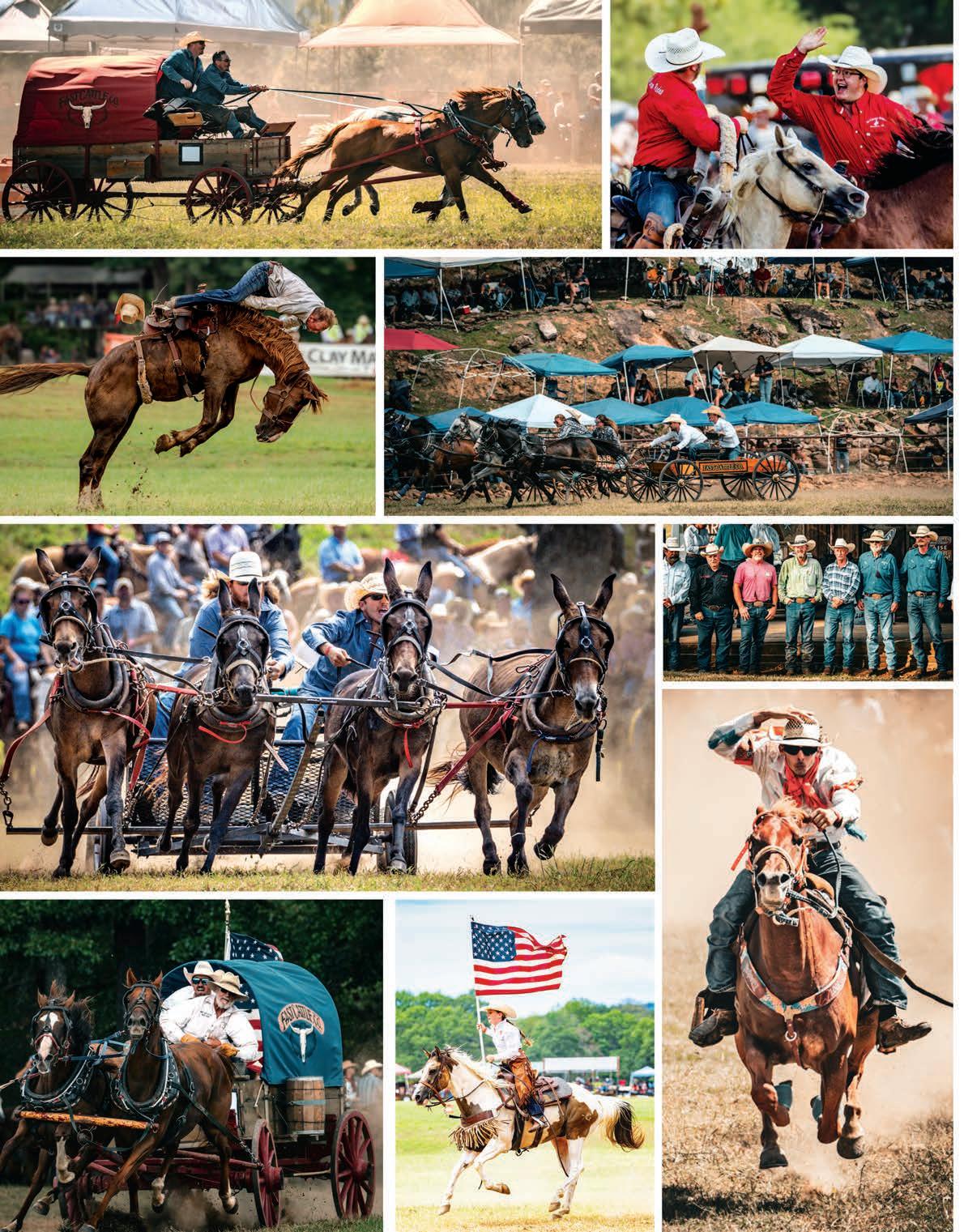


FAMILY: My husband, Dr. Shannon Greenfield, is a clinical psychologist in private practice. We have two grown-and-flown adult children and one oversized boxer dog. Our son, Evan, works in Little Rock in the field of transportation logistics, and our daughter works in Atlanta, Georgia, in the field of global public health.
EDUCATION: In 1991, I graduated from Hendrix College in Conway and went on to earn a master’s degree in education administration from Appalachian State University in Boone, N.C. I began my career in higher education in the area of fundraising and development in Missouri and at Hendrix College. I later moved into the nonprofit world and enjoyed working at the Arkansas Arts Center and Arkansas Children’s Hospital Foundation. I’ve been employed at LifeQuest of Arkansas since 2015 and have served as executive director since January 2022.
PROFESSIONAL ACCOMPLISHMENTS: I serve on the board of Aging Forward. Formerly known as Shepherd’s Center of America, Aging Forward is a national network of affiliate organizations serving older adults across the country. LifeQuest is the largest affiliate organization in the Aging Forward network for the size of its educational program.
SPECIAL INTERESTS: I love to travel! A favorite trip last summer was to England and Wales, especially London and the Cotswolds. This summer, my family and I travelled to Boston and Maine and loved the cooler weather and wonderful seafood! I must be drawn to the water because I’m looking forward to visiting Martha’s Vineyard in August and Charleston, S.C., in December.
WHAT DO YOU LOVE ABOUT THE 501? Friends and family! Parents, aunts, uncles and cousins are mostly gathered in Little Rock, and the majority of my college friends from Hendrix are also here. Arkansas is truly the natural state. We are so blessed to have beautiful and accessible parks and trails for biking and walking. Another asset is our public library system, which is such a resource for our community.
Since 1981, LifeQuest has served older adults in our community and state by promoting healthful longevity and active aging through lifelong learning and meaningful volunteerism. As the state’s largest educational organization for retired-aged adults, LifeQuest is similar to a small college – with no test, grades or required attendance! Inquisitive older adults come together for the joy of lifelong learning and to stay intellectually engaged, socially connected and physically active. LifeQuest is a volunteerled organization. Hundreds of volunteers make the program possible through teaching, planning, organizing and serving our members. Approximately 2,000 members enroll in 275-plus classes per year — all taught by volunteers! It truly takes a village to keep LifeQuest running.
As we approach our 45th anniversary, the LifeQuest board of directors developed the visionary goal to grow our programs and to strengthen LifeQuest’s position as a leader in lifelong learning for older Arkansans. To meet this goal, the first satellite campus, LifeQuest at Conway, will open on Sept. 15. In partnership with Hendrix College, our lifelong learning model of volunteer-led classes is anticipated to expand to meet the continuing education needs and interests of the Conway-area community and beyond.

